#earliest known sentence
Explore tagged Tumblr posts
Text
Head-Lice Comb Of The Week
The earliest known sentence has been discovered, according to archaeologists at @HebrewU at #TelLachish and it is on a nits comb #archaeology
The development of writing is one of humankind’s greatest achievements, allowing the spread of ideas and wonderful literature, a process accelerated by the invention of the printing press. In idle moments I wonder what was the first set of thoughts that were put down in writing. Was it some lofty philosophical thought, the plot line for a blockbuster novel, or a shopping list? Perhaps…
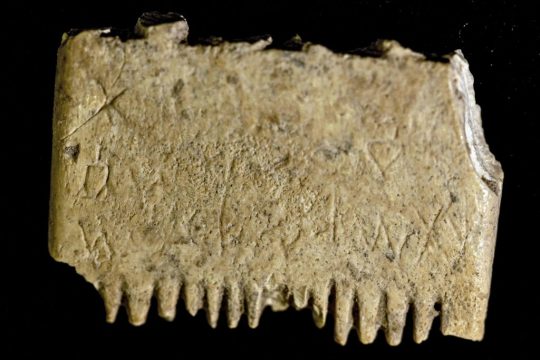
View On WordPress
1 note
·
View note
Text
In 1931, a scholar named Bernhard Bischoff decoded a cypher placed between two saints’ lives in an early ninth-century manuscript from Eichstätt, Germany. The lives were written about Saints Willibald and Winnebald, two English brothers who in the eighth century became, respectively, the Bishop of Eichstätt and Abbott of Heidenheim, both in the modern day region of Bavaria. The cypher reads:

Secundumgquartum quintumnprimum sprimumxquartumntertium cprimum nquartummtertiumnsecundum hquintumgsecundum bquintumrc quartumrdinando hsecundumc scrtertium bsecundumbprimumm
Bischoff worked out that all vowels had been replaced by ordinal numbers - ‘second, g, fourth, fifth, n, first, s…’ and so on. Each of these numbers could be replaced with the corresponding vowel, to make the Latin sentence: Ego una Saxonica nomine Hugeburc ordinando hec scribebam I, a Saxon nun called Hugeburc, have written this ... Hugeburc is the earliest known English woman author of a full-text literary work.
632 notes
·
View notes
Text
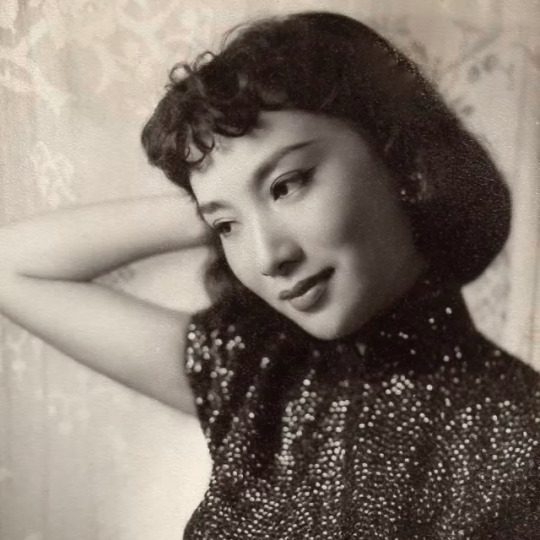

Propaganda
Xia Meng, also known as Hsia Moog or Miranda Yang (Sunrise, Bride Hunter)—For those who are familiar with Hong Kong's early cinema, Xia Meng is THE leading woman of an era, the earliest "silver-screen goddess", "The Great Beauty" and "Audrey Hepburn of the East". Xia Meng starred in 38 films in her 17-year career, and famously had rarely any flops, from her first film at the age of 18 to her last at the age of 35. She was a rare all-round actress in Mandarin-language films, acting, singing, and dancing with an enchanting ease in films of diverse genres, from contemporary drama to period operas. She was regarded as the "crown princess" among the "Three Princesses of the Great Wall", the iconic leading stars of the Great Wall Movie Enterprises, which was Hong Kong's leading left-wing studio in the 1950s-60s. At the time, Hong Kong cinema had only just taken off, but Xia Meng's influence had already spread out to China, Singapore, etc. Overseas Chinese-language magazines and newspapers often featured her on their covers. The famous HK wuxia novelist Jin Yong had such a huge crush on her that he made up a whole fake identity as a nobody-screenwriter to join the Great Wall studio just so he can write scripts for her. He famously said, "No one has really seen how beautiful Xi Shi (one of the renowned Four Beauties of ancient China) is, I think she should be just like Xia Meng to live up to her name." In 1980, she returned to the HK film industry by forming the Bluebird Movie Enterprises. As a producer with a heart for the community, she wanted to make a film on the Vietnam War and the many Vietnam War refugees migrating to Hong Kong. She approached director Ann Hui and produced the debut film Boat People (1982), a globally successful movie and landmark feature for Hong Kong New Wave, which won several awards including the best picture and best director in the second Hong Kong Film Award. Years later, Ann Hui looked back on her collaboration with Xia Meng, "I'm very grateful to her for allowing me to make what is probably the best film I've ever made in my life."
Anita Ekberg (War and Peace, La Dolce Vita)— I'm going to be frank with you. Every time I look at this woman, I lose my ability to form sentences.
This is round 4 of the tournament. All other polls in this bracket can be found here. Please reblog with further support of your beloved hot sexy vintage woman.
[additional propaganda submitted under the cut.]
Xia Meng:

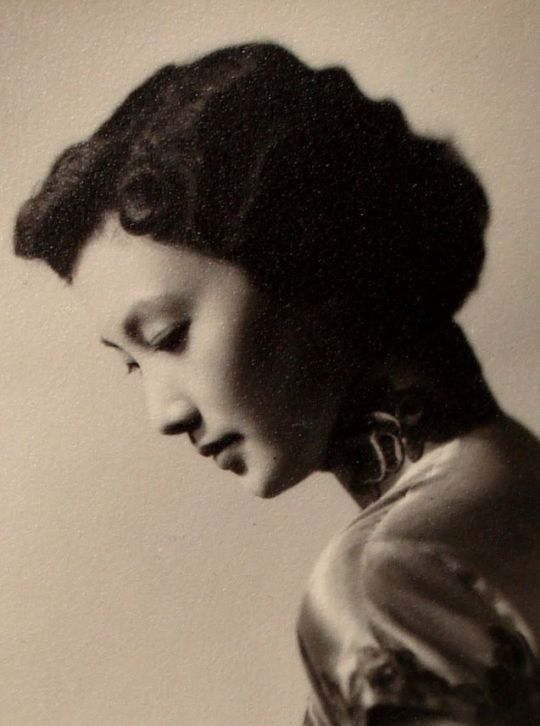
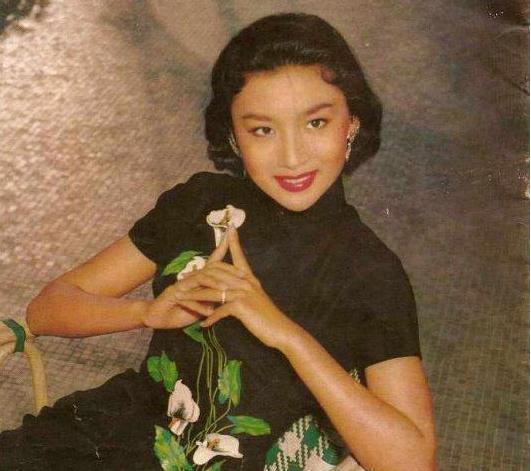
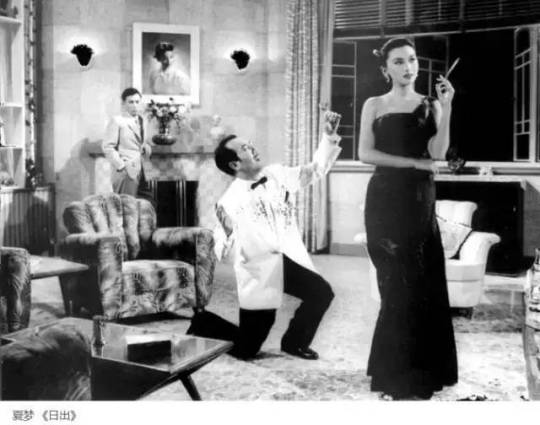

Anita Ekberg:
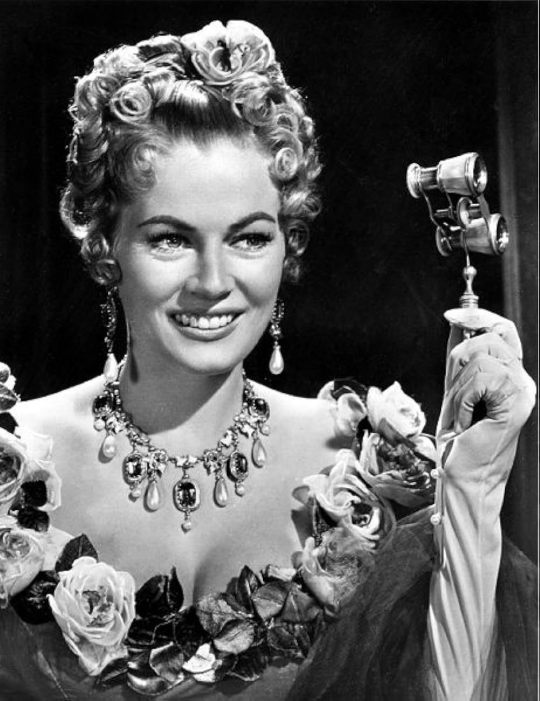
“I haven't seen much starring her (YET) but the scene of her in the Fontana di Trevi in La Dolce Vita is some of the most jealous I've ever been of Marcello Mastroianni maybe and that's saying a lot. Cinema history. Historical.”
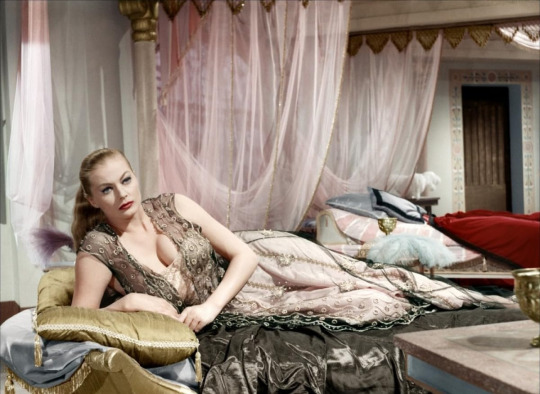
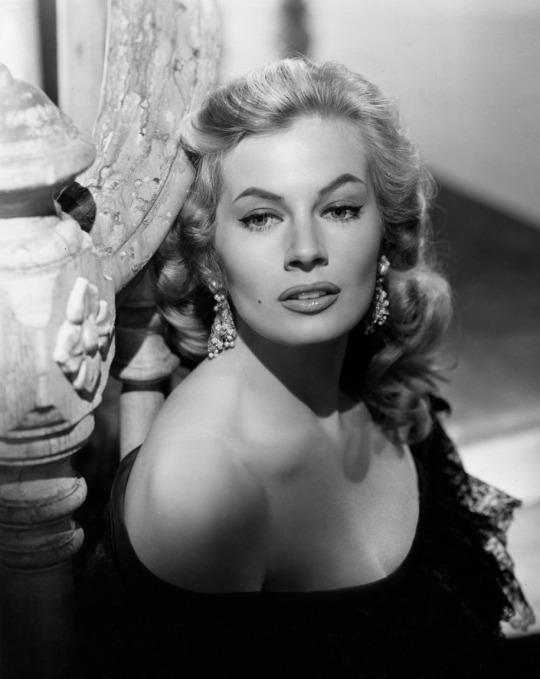
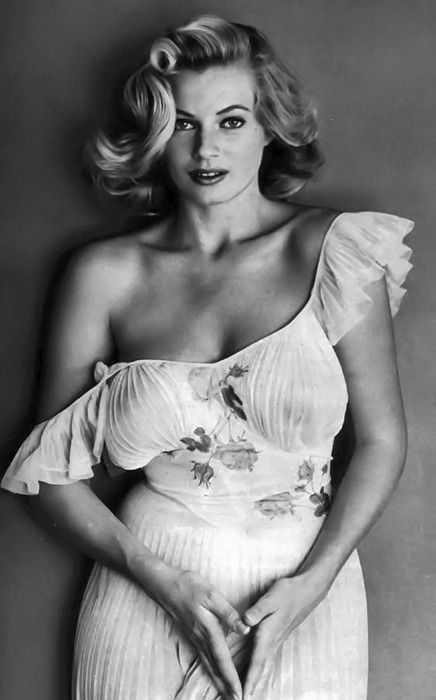
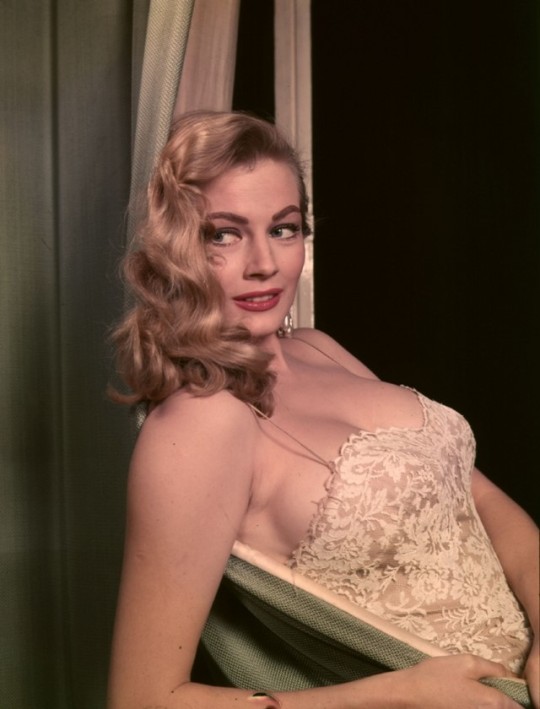
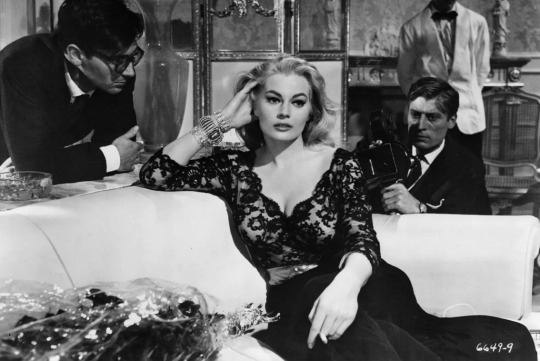

276 notes
·
View notes
Text
April 14, Xi'an, China, Shaanxi History Museum, Qin and Han Dynasties Branch (Part 3 – Innovations and Philosophies):
(Edit: sorry this post came out so late, I got hit by the truck named life and had to get some rest, and this post in itself took some effort to research. But anyway it's finally up, please enjoy!)
A little background first, because this naming might lead to some confusions.....when you see location adjectives like "eastern", "western", "northern", "southern" added to the front of Zhou dynasty, Han dynasty, Song dynasty, and Jin/晋 dynasty, it just means the location of the capital city has changed. For example Han dynasty had its capital at Chang'an (Xi'an today) in the beginning, but after the very brief but not officially recognized "Xin dynasty" (9 - 23 AD; not officially recognized in traditional Chinese historiography, it's usually seen as a part of Han dynasty), Luoyang became the new capital. Because Chang'an is geographically to the west of Luoyang, the Han dynasty pre-Xin is called Western Han dynasty (202 BC - 8 AD), and the Han dynasty post-Xin is called Eastern Han dynasty (25 - 220 AD). As you can see here, in these cases this sort of adjective is simply used to indicate different time periods in the same dynasty.
Model of a dragonbone water lift/龙骨水车, Eastern Han dynasty. This is mainly used to push water up to higher elevations for the purpose of irrigation:
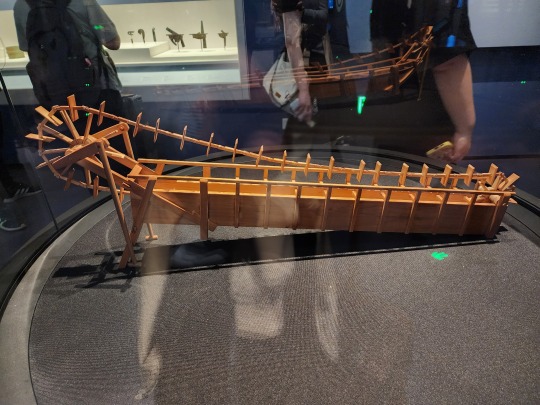
Model of a water-powered bellows/冶铁水排, Eastern Han dynasty. Just as the name implies, as flowing water pushes the water wheel around, the parts connected to the axle will pull and push on the bellows alternately, delivering more air to the furnace for the purpose of casting iron.
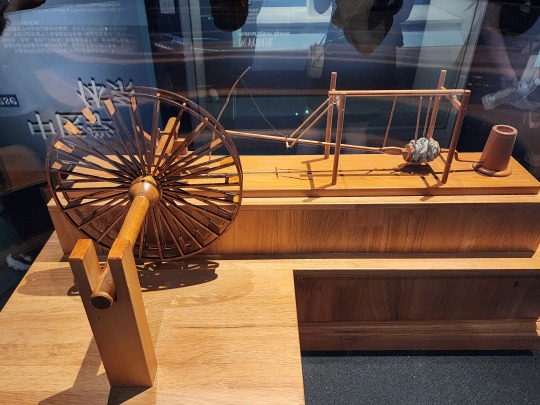
The Nine Chapters on the Mathematical Art/《九章算术》, Fangcheng/方程 chapter. It’s a compilation of the work of many scholars from 10 th century BC until 2 nd century AD, and while the earliest authors are unknown, it has been edited and supplemented by known scholars during Western Han dynasty (also when the final version of this book was compiled), then commented on by scholars during Three Kingdoms period (Kingdom of Wei) and Tang dynasty. The final version contains 246 example problems and solutions that focus on practical applications, for example measuring land, surveying land, construction, trading, and distributing taxes. This focus on practicality is because it has been used as a textbook to train civil servants. Note that during Han dynasty, fangcheng means the method of solving systems of linear equations; today, fangcheng simply means equation. For anyone who wants to know a little more about this book and math in ancient China, here’s an article about it. (link goes to pdf)
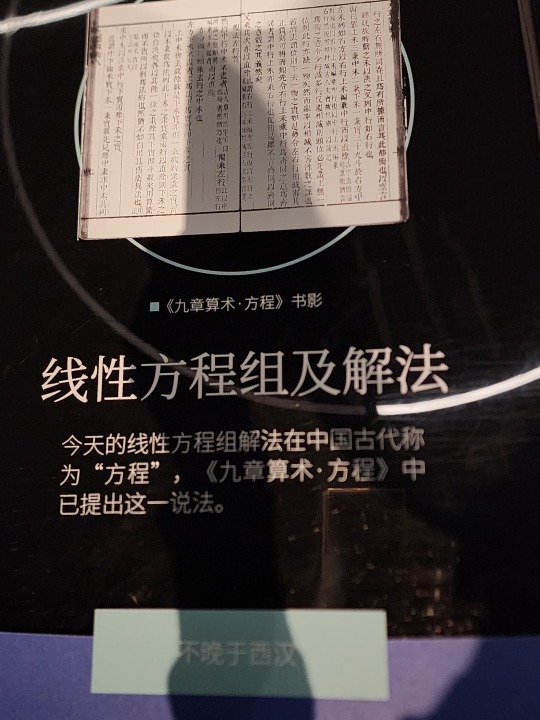
Diagram of a circle in a right triangle (called “勾股容圆” in Chinese), from the book Ceyuan Haijing/《测圆海镜》 by Yuan-era mathematician Li Ye/李冶 (his name was originally Li Zhi/李治) in 1248. Note that Pythagorean Theorem was known by the name Gougu Theorem/勾股定理 in ancient China, where gou/勾 and gu/股 mean the shorter and longer legs of the right triangle respectively, and the hypotenuse is named xian/弦 (unlike what the above linked article suggests, this naming has more to do with the ancient Chinese percussion instrument qing/磬, which is shaped similar to a right triangle). Gougu Theorem was recorded in the ancient Chinese mathematical work Zhoubi Suanjing/《周髀算经》, and the name Gougu Theorem is still used in China today.
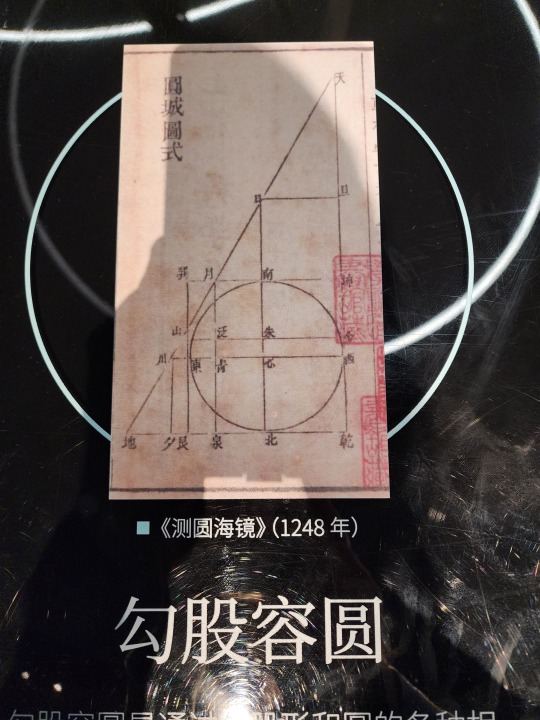
Diagram of the proof for Gougu Theorem in Zhoubi Suanjing. The sentence on the left translates to "gou (shorter leg) squared and gu (longer leg) squared makes up xian (hypotenuse) squared", which is basically the equation a² + b² = c². Note that the character for "squared" here (mi/幂) means "power" today.

This is a diagram of Zhang Heng’s seismoscope, called houfeng didong yi/候风地动仪 (lit. “instrument that measures the winds and the movements of the earth”). It was invented during Eastern Han dynasty, but no artifact of houfeng didong yi has been discovered yet, this is presumably due to constant wars at the end of Eastern Han dynasty. All models and diagrams that exist right now are what historians and seismologists think it should look like based on descriptions from Eastern Han dynasty. This diagram is based on the most popular model by Wang Zhenduo that has an inverted column at the center, but this model has been widely criticized for its ability to actually detect earthquakes. A newer model that came out in 2005 with a swinging column pendulum in the center has shown the ability to detect earthquakes, but has yet to demonstrate ability to reliably detect the direction where the waves originate, and is also inconsistent with the descriptions recorded in ancient texts. What houfeng didong yi really looks like and how it really works remains a mystery.
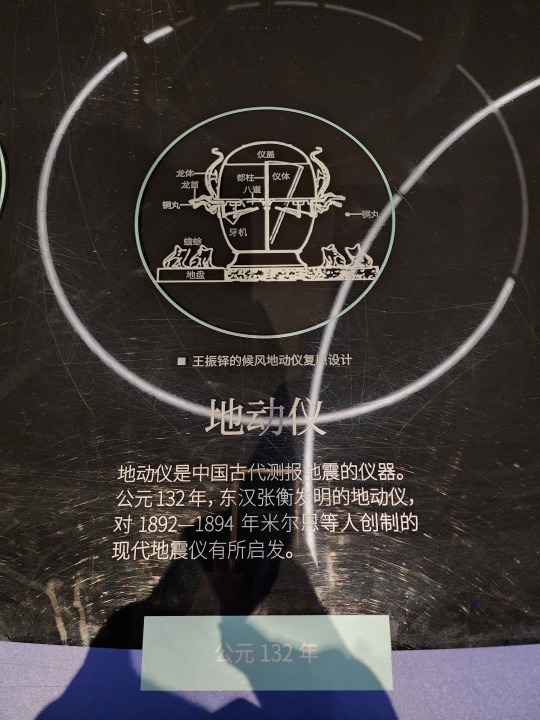
Xin dynasty bronze calipers, the earliest sliding caliper found as of now (not the earliest caliper btw). This diagram is the line drawing of the actual artifact (right).
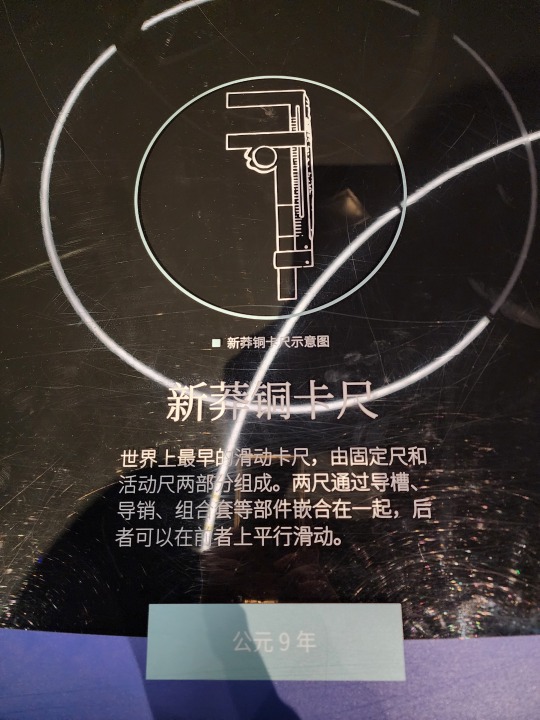

Ancient Chinese "Jacquard" loom (called 提花机 or simply 花机 in Chinese, lit. "raise pattern machine"), which first appeared no later than 1st century BC. The illustration here is from the Ming-era (1368 - 1644) encyclopedia Tiangong Kaiwu/《天工开物》. Basically it's a giant loom operated by two people, the person below is the weaver, and the person sitting atop is the one who controls which warp threads should be lifted at what time (all already determined at the designing stage before any weaving begins), which creates patterns woven into the fabric. Here is a video that briefly shows how this type of loom works (start from around 1:00). For Hanfu lovers, this is how zhuanghua/妆花 fabric used to be woven, and how traditional silk fabrics like yunjin/��锦 continue to be woven. Because it is so labor intensive, real jacquard silk brocade woven this way are extremely expensive, so the vast majority of zhuanghua hanfu on the market are made from machine woven synthetic materials.
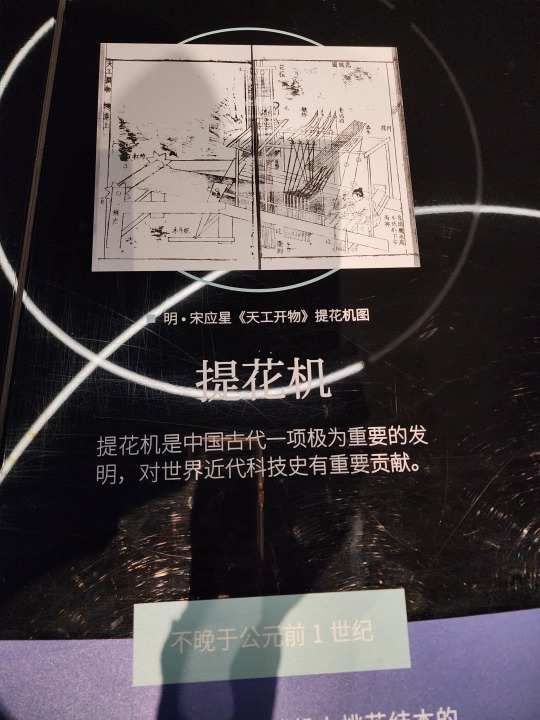
Chinese purple is a synthetic pigment with the chemical formula BaCuSi2O6. There's also a Chinese blue pigment. If anyone is interested in the chemistry of these two compounds, here's a paper on the topic. (link goes to pdf)
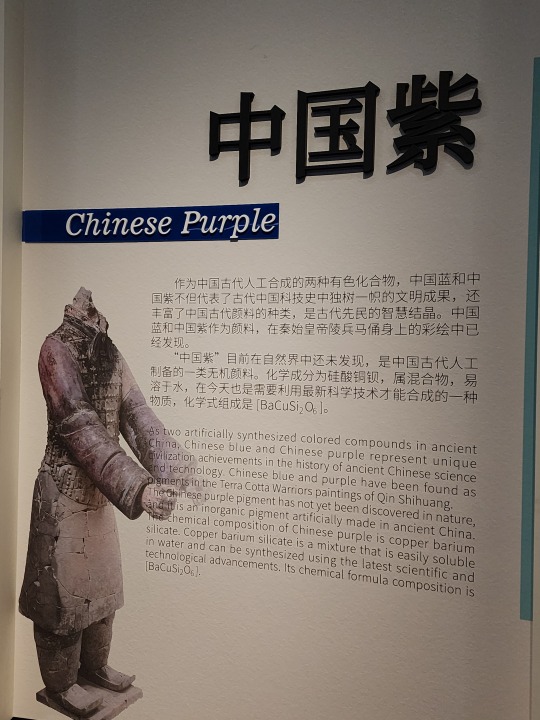
A list of common colors used in Qin and Han dynasties and the pigments involved. White pigment comes from chalk, lead compounds, and powdered sea shells; green pigment comes from malachite mineral; blue pigment usually comes from azurite mineral; black comes from pine soot and graphite; red comes from cinnabar; ochre comes from hematite; and yellow comes from realgar and orpiment minerals.

Also here are names of different colors and shades during Han dynasty. It's worth noting that qing/青 can mean green (ex: 青草, "green grass"), blue (ex: 青天, "blue sky"), any shade between green and blue, or even black (ex: 青丝, "black hair") in ancient Chinese depending on the context. Today 青 can mean green, blue, and everything in between.

Western Han-era bronze lamp shaped like a goose holding a fish in its beak. This lamp is interesting as the whole thing is hollow, so the smoke from the fire in the lamp (the fish shaped part) will go up into the neck of the goose, then go down into the body of the goose where there's water to catch the smoke, this way the smoke will not be released to the surrounding environment. There are also other lamps from around the same time designed like this, for example the famous gilt bronze lamp that's shaped like a kneeling person holding a lamp.
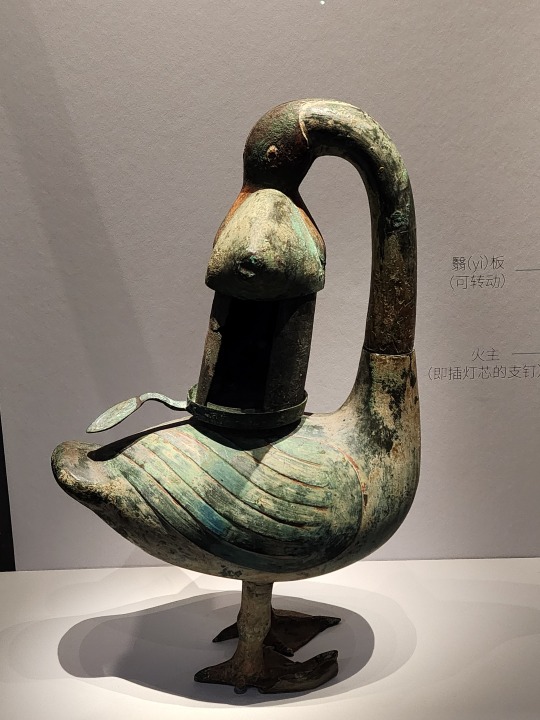
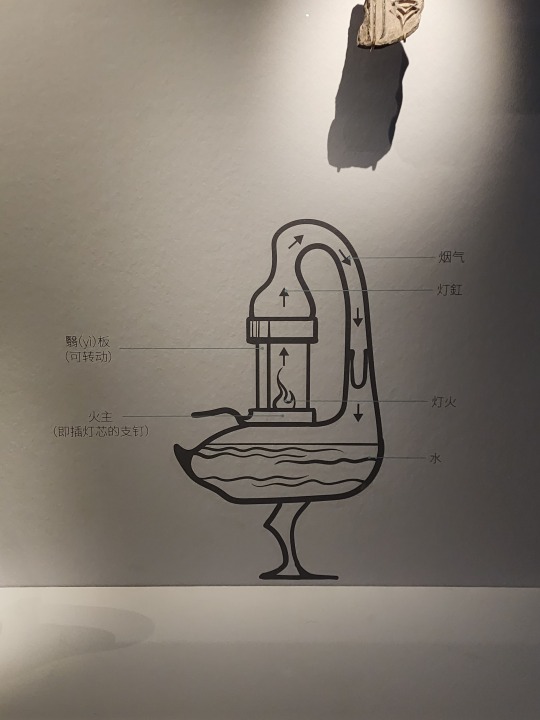
Part of a Qin-era (?) clay drainage pipe system:
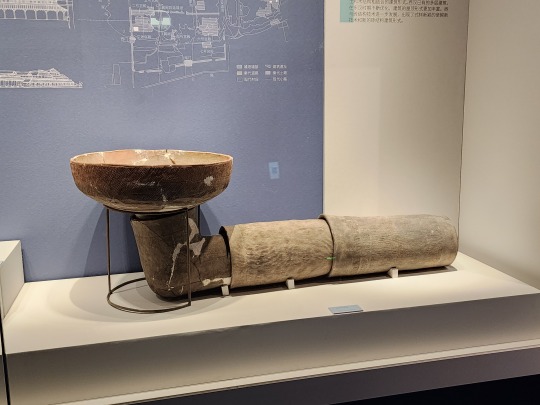
A list of canals that was dug during Warring States period, Qin dynasty, and pre-Emperor Wu of Han Han dynasty (475 - 141 BC). Their purposes vary from transportation to irrigation. The name of the first canal on the list, Hong Gou/鸿沟, has already become a word in Chinese language, a metaphor for a clear separation that cannot be crossed (ex: 不可逾越的鸿沟, meaning "a gulf that cannot be crossed").

Han-era wooden boat. This boat is special in that its construction has clear inspirations from the ancient Romans, another indication of the amount of information exchange that took place along the Silk Road:

A model that shows how the Great Wall was constructed in Qin dynasty. Laborers would use bamboo to construct a scaffold (bamboo scaffolding is still used in construction today btw, though it's being gradually phased out) so people and materials (stone bricks and dirt) can get up onto the wall. Then the dirt in the middle of the wall would be compressed into rammed earth, called hangtu/夯土. A layer of stone bricks may be added to the outside of the hangtu wall to protect it from the elements. This was also the method of construction for many city walls in ancient China.
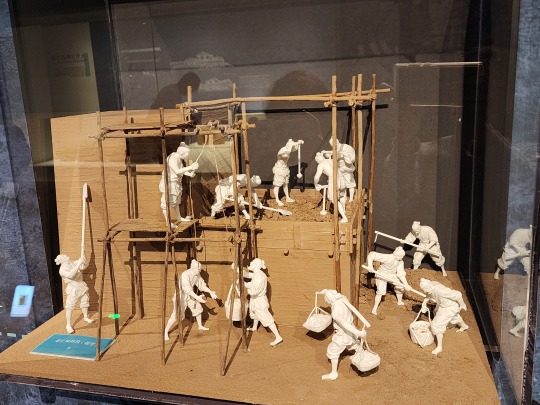
A list of the schools of thought that existed during Warring States period, their most influential figures, their scholars, and their most famous works. These include Confucianism (called Ru Jia/儒家 in Chinese; usually the suffix "家" at the end denotes a school of thought, not a religion; the suffix "教" is that one that denotes a religion), Daoism/道家, Legalism (Fa Jia/法家), Mohism/墨家, etc.
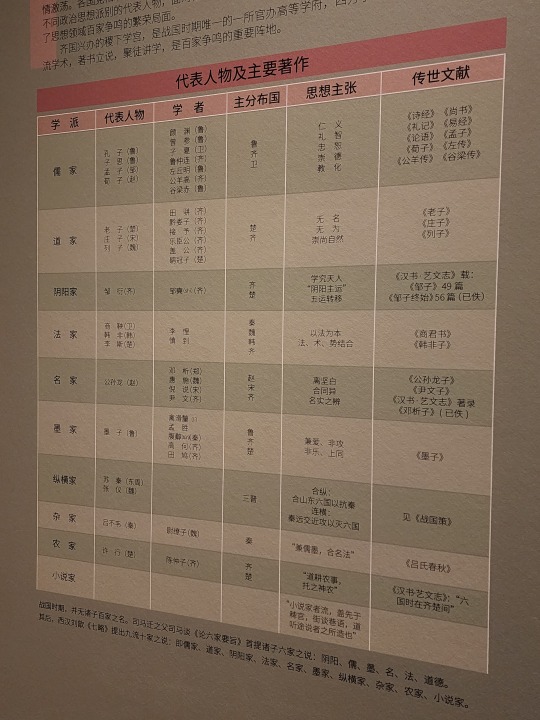
The "Five Classics" (五经) in the "Four Books and Five Classics" (四书五经) associated with the Confucian tradition, they are Shijing/《诗经》 (Classic of Poetry), Yijing/《易经》 (also known as I Ching), Shangshu/《尚书》 (Classic of History), Liji/《礼记》 (Book of Rites), and Chunqiu/《春秋》 (Spring and Autumn Annals). The "Four Books" (四书) are Daxue/《大学》 (Great Learning), Zhongyong/《中庸》 (Doctrine of the Mean), Lunyu/《论语》 (Analects), and Mengzi/《孟子》 (known as Mencius).
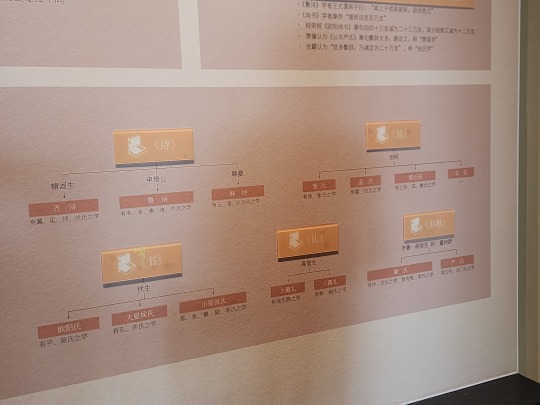
And finally the souvenir shop! Here's a Chinese chess (xiangqi/象棋) set where the pieces are fashioned like Western chess, in that they actually look like the things they are supposed to represent, compared to traditional Chinese chess pieces where each one is just a round wooden piece with the Chinese character for the piece on top:
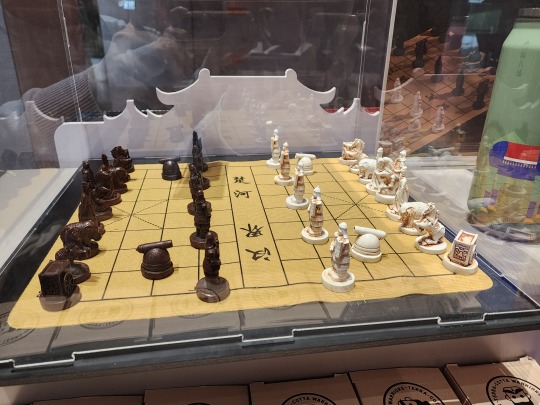
A blind box set of small figurines that are supposed to mimic Shang and Zhou era animal-shaped bronze vessels. Fun fact, in Shang dynasty people revered owls, and there was a female general named Fu Hao/妇好 who was buried with an owl-shaped bronze vessel, so that's why this set has three different owls (top left, top right, and middle). I got one of these owls (I love birds so yay!)
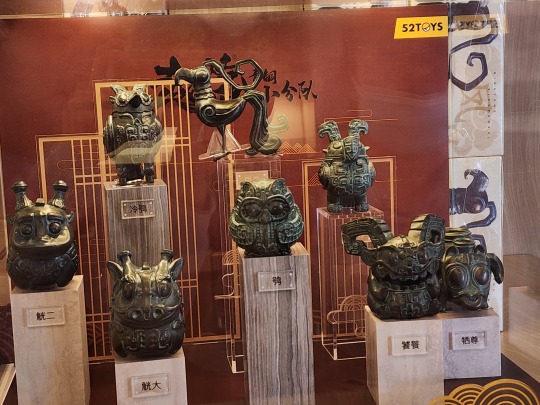
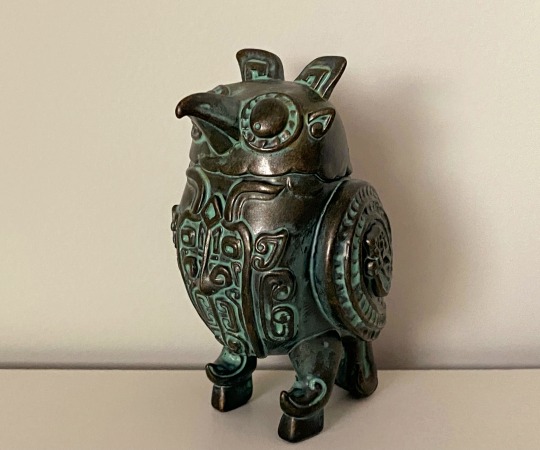
And that concludes the museums I visited while in Xi'an!
#2024 china#xi'an#china#shaanxi history museum qin and han dynasties branch#chinese history#chinese culture#chinese language#qin dynasty#han dynasty#warring states period#chinese philosophy#ancient technology#math history#history#culture#language
86 notes
·
View notes
Text
Tip Top, Thank You. Ticketyboo!
Did you all know that "tip top" is MLE slang for a blowjob?

Now that I have your attention lol, some etymological meta on The Ineffables' rather tip top use of slang and wordplay and just what it means to offer to say "thank you" in Ineffable Husbands Speak under the cut. It's absolutely ticketyboo...
When we humans who speak English refer to oral sex performed on a penis, the most common slang we use for this today is to call it "giving a blowjob." Linguistically-speaking, this term is actually relatively new and how it came to be is a truly muddled bit of etymological history. As recently as the early 1950s, the American military was innocently referring to their war planes in different publications as "blow jobs"-- meaning that the planes were well-equipped to carry out destruction. This-- and other instances like this at the time-- shows that the meaning of "blowjob" as slang for oral sex performed on someone with a penis either had not yet really evolved at all or had not yet penetrated the mainstream enough for any of the people involved in these articles (journalists, editors, four-star generals lol...) to suggest that, perhaps, a different term be used to describe these planes.
Whether or not the slang term "blowjob" is actually derived from the military... as soldiers appropriating the language of war to turn it into the language of sex has been happening since the beginning of time... or whether it arose in a different way, is still unknown. The earliest documentation of something like "blowjob" comes from sex workers in the 1930s who referred to what we call giving a blowjob as "blowing someone off." This is obviously funny now from a language evolution perspective, considering that when we use that phrase today, what we mean is that we dodged an interaction with someone, as in "I was supposed to grab coffee with my friend yesterday but I was tired so I blew him off." If you said that sentence to a Mrs. Sandwich in 1935, she'd have several follow up questions...
Further complicating the history of the term is that since the origin of "blowjob" as a term is murky, no one has ever really been very clear on which kind of "blow" is being addressed in it or if it refers to multiple kinds at once. Is it a "blowjob" because of aspects of the act of it or is it a "blowjob" because the end result is, as the military influence might suggest, that the recipient "blows", meaning comes apart/ejaculates? Either way, it's the most common way you refer to this type of oral sex in English but, as we know, different groups of people have additional slang to refer to it as well. Crowley and Aziraphale are shown in S1 to have picked up the MLE slang term for it of tip top.
MLE stands for Multicultural London English and it is what is known as a sociolect. A sociolect is a dialect that's built more out of being a part of a certain social class or group. MLE is also a multiethnolect, which means that it is a dialect derived from the influence of people of different ethnicities and backgrounds. It is the language spoken by a diverse group of working-class people, most of them younger, who live and/or work in London, and has mostly emerged since the 1980s. One of its slang words is the use of tip top to mean a blowjob. It is sometimes shortened just to top, if context in the sentence allows for the meaning to be understood as a blowjob and to not be confused with other sexual meanings around the word "top."
Tip top is an example of different dialects crossing and interweaving. MLE uses "side ting", for example, to describe sleeping with someone other than one's partner which, just like its American counterpart of "side piece", is derived from the British English phrase "bit on the side", which we also hear Nina and Crowley use in S2. In S1, Aziraphale used ticketyboo, which is Victorian-era slang that is also thought to be an example of different dialects crossing. Theories on its etymology involve a Hindi saying, a British one, and a bit of French intermixing. It is an example of Crowley and Aziraphale's interest in the ongoing evolution of language and how they weave that into their wordplay. We'll come back to ticketyboo later on. Tip top and saying thank you are up first...
Tip top is originally a British English-rooted expression meaning someone is feeling excellent or that something is in excellent shape. It refers to the tip of the top-- the highest of peaks. There is then a fun sense of humor to it being adopted from its endearing but potentially kind of stuffy British use ("How are you, my good man?"/"I am tip top, old chap! Right as rain!" lol) to becoming slang for oral sex in a dialect used by predominantly non-white, younger Londoners, many of whom emigrated to England or who come from immigrant families, particularly from countries that either still are part of or were formerly part of The British Empire. There's a top shelf, droll trolling of the colonizing British Empire happening there in the language evolution and it's also a good example of how when different cultures overlap, so too do their languages.
Crowley and Aziraphale always have to choose words that are able to remain hidden beneath the surface layer of their conversation. One of their wordplay kinks that we've observed are words that have multiple different meanings, as we looked at in other metas. Their favorites are ones with hilariously contradictory meanings that they can use to create sentences that have one meaning on the surface with one interpretation of the definitions used of the words and another entirely if the other meanings of those same words are used. They get off a bit on using common words in Ineffable Husbands Speak when speaking to others-- particularly angels and demons-- who have no idea what they're talking about because they only understand one level of meaning of the words being used and assume the context implying that one level of meaning is correct. Examples of these types of scenes: the Aziraphale one in Heaven that I'll mention again below, Aziraphale in Hell in 1.06 and then telling Crowley "I asked them for a rubber duck" to make him laugh afterwards, Crowley's "can I get a wahoo?" and what he says to Gabriel before getting into the fire in 1.06 having a different meaning in Ineffable Husbands Speak, as well as almost everything Crowley said to Muriel in the second half of S2 (the handcuff innuendo; "extremely alcoholic breakfast at The Ritz", etc..)
We've seen that some of their favorite words like this are wily (meaning sly, tricky, crafty on one level but also alluring, magically attractive, sexy on another), smitten (to be attacked by an angel with the righteous fury of God but also to be struck down with love and infatuation), and thwart (to oppose and stop but also to cross from one side to the other.)

Aziraphale called Crowley a "wily adversary" to the angels in Heaven and could barely keep a straight face because when he and Crowley say "wily" to one another, they mean it as "sexy." (As in, "he was a wily old serpent and I was technically on apple tree duty.") Crowley used "thwart" multiple times in the same scene in 1.01 as an euphemism for "fucking", as in:

(I also love that, out of all the different names the thing has, Crowley and Aziraphale call it "The Divine Plan" while flirting in this scene, since divine means "of God" or "like God" but it also is used just to mean "delightful" or "delicious," as in "the wedding was lovely-- we had a divine time!" or "mmm, gah, this cake is divine..."
Additionally, another meaning of thwart is that it's the term for the seat in a rowboat that someone would sit on to row a boat and, like we looked at in the Fish meta, Crowley and Aziraphale have their whole we-got-oysters-the-first-night-we-slept-together-so-now-everything-related-to-fish-and-the-sea-is-a-sexual-euphemism-or-metaphor thing happening. Wahoo to that sushi but anyway we're talking about blowjobs, so... *redirects self*...)
As we were talking about at the start of this meta, calling oral sex on a penis a "blowjob" is a relatively new thing but different euphemisms for it have existed forever. By the above measure for words used in Ineffable Husbands Speak, though, tip top is a tip top choice for a blowjob euphemism, old chaps, as there is just a lot of word nerdy wordplay potential there. One of the reasons why Crowley and Aziraphale use it is also one of the reasons why it has likely evolved to mean a blowjob in MLE in the first place and that is because of the innuendo inherent in a phrase involving "tip", as in the sensitive tip of the penis, which is especially humorous when added into the fact that "tip top" means "excellent." You're just hitting the tippity top when you get a tip top, no? Just reaching the highest of those climatic peaks...
The first time we hear Aziraphale use tip top is in the paintball scene at Tadfield Manor in S1. Crowley and Aziraphale are hit with the paint, Crowley shapeshifts into a roaring snake and causes a guy to pass out and his already high levels of horniness increases until he's doing the lip bite and the cute nose scrunch that screams 'do me':
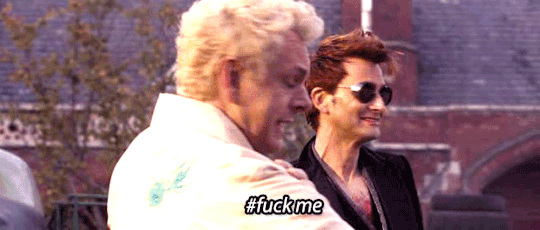
Meanwhile, Aziraphale sounds all innocent (it's faux-innocent, as it often is lol) and is going on about the paint on his coat and he says that he's "kept this coat in tip top condition for over 200 years" and starts to pout.
Crowley and Aziraphale are supernatural humanoid beings with feathers and Crowley is also a snake. They have a seemingly never-ending list of comparisons to other creatures of Earth happening and some of it trips over into their innuendo. A coat, on one level, is the coat that Aziraphale is wearing in the scene that was splattered in blue paint but... it's also a word used to describe the fur or hair of an animal.
Aziraphale has kept his coat-- the beige outer layer of his clothes-- in tip top condition-- so, in well-maintained, excellent condition-- for more than the last 200 years. Euphemistically-speaking, though... Aziraphale is referring to the apparently historically well-groomed state of his hair-- specifically, his pubic hair-- which he's always got lookin' fine and zhushed for visitors. Aziraphale keeps his coat in tip top condition because loves him the highest peaks of the tippity tops does the angel...
(Sidenote but Aziraphale has massive pubic hair thing happening, as this is not the only scene he's referred to it euphemistically. In S2, as we looked at in the meta about his dirty French, he used "plume" in its "feathered" sense to euphemistically refer to missing quality time with Lady Crowley's natural garden box.)
Is now a good time to mention Mr. Fell and the blowjob's formal name of fellatio? Fellation and fellatio are rooted in the Latin verb fellare, which means "to suck", though "to fellate" and "fellatio" became words relating to oral sex only as relatively recently as during the 1800s. The Latin verb, though, has existed basically for forever and considering Aziraphale's kind of cheeky use of Fell as his surname in reference to how while he might not have fallen to Hell in the angel/demon sense of it, he's "fallen" into "sin" of the Adam-and-Eve, food-and-sex sense of the term, one of the reasons behind choosing Fell as his surname then could be tied to the verb fellare and his penchant for giving and receiving oral sex. (And how do we know that it wasn't, say, Crowley in the 1800s who got the ball rolling on using that Latin verb to refer to a blowjob? lol) At minimum, it's too funny for Crowley and Aziraphale to have never made a joke about it at some point. Back to the paintball scene...
Crowley knows what tip top means in this scene and it's clearly already existed in Ineffable Husbands Speak for some time. His mending of Aziraphale's coat is then in an exaggerated manner involving some (magically unnecessary) blowing, visually referencing the tip top/blowjob wordplay that Aziraphale was doing to suggest that they get up to that activity soon:
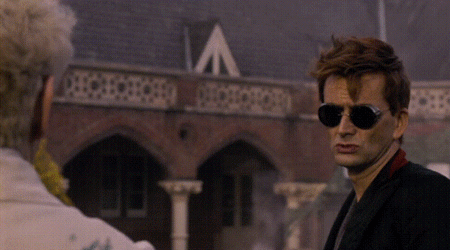
But tip top is far from the only blowjob-related term in this scene...
While this scene takes place in the 2019 present of S1, recall that I mentioned above that MLE is not that old as sociolects go. It's definitely old enough and close enough to Crowley and Aziraphale for them to know it-- and the above illustrates them using it-- but what about before MLE emerged to give them the tip top slang option? What did Crowley and Aziraphale call a blowjob in their language before the 1980s/1990s?
The paintball scene then sees them show us another euphemism for it that other scenes in the series show us that they've been using for at least a few hundred years. Let's talk about the etymology of 'thank' and what they mean when they offer to say 'thank you.'
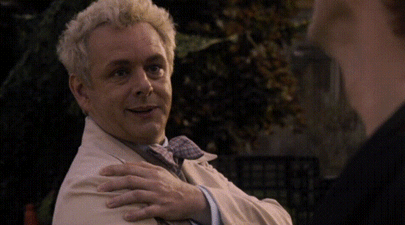
The word thank is etymologically tied to the same root words as both thought and think... which are, of course, things you do with your head. They are all rooted in the Latin tongere. The word tongue is rooted to both tongere and the Latin lingua, for languages. As a result, the words tongue, think, and thank are all linked together in their histories and, as an added bonus, are also tied to words related to languages and wordplay, which makes it all a little extra funny from hidden language/innuendo standpoint.
The other common euphemism for giving a blowjob is to refer to it as "giving head." You think with your head and use your tongue to speak but... you also use your tongue when you've got your head in your partner's lap... You bow your head to pray, which is referred to as to 'give thanks' to God... and you bow your head to make your partner feel tip top...
Oh, hello, Blasphemy Kink, Our Old Friend... 😇
In the paintball scene, Aziraphale smiles dirtily and says "oh, thank you" after Crowley mends his coat, and gives Crowley that look that says that he wants to give him a proper thank you for his help. Mrs. Sandwich in S2 picks up on the seamstress/clothing innuendo theme when she's going on suggestively about her girls' ability and willingness to mend a gentlemen's shirt, nodding back to Crowley's hollowed-cheeked bit of magical seamstressing in S1.
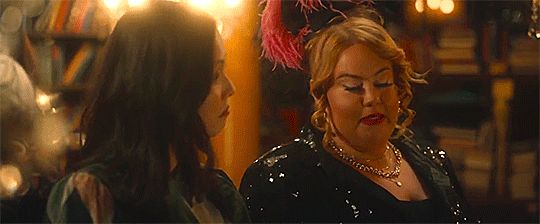
If you look at Crowley in the above Aziraphale-saying-thank-you gif, you'll notice from the movement of his head, that Crowley replied-- with a humorous tone-- the standard response to someone verbally saying "thank you" which is, of course: "You're welcome."
"You're welcome" is every bit as funny and dirty as "thank you" in this context...
First, there's that "welcome" is homophonic for both "will come" and "we'll come." Aziraphale says he wants to give thanks and Crowley replies with the assured, well, outcomes of that outpouring of gratitude. 😂 But there's also the amazing history of "welcome"...
"Welcome" is derived from combining two words in Old English: the prefix wil-, which means "desire, pleasure" and the word cuman, which means "come." Together, they also formed the word in Old English that is the origin of "welcome"-- 'wilcuma'-- which meant (I kid you not) "a person whose coming is pleasing."
Aziraphale is always very welcome, as far as Crowley is concerned lol.
The spelling evolved into "welcome" over time, thought to be influenced by the Old Norse velkominn (which is from where the modern German "welcome" of "willkommen" is derived.) Mixed in the evolution of "welcome" is also the Old French "bien venu" (which has evolved into its modern form of "bienvenue"). "Bien" in French means "good" and "venu" is of the French verb venir, which means "to come."
Obviously, the original meaning of wilcuma/welcome is in reference to hospitality of a less sexual nature. If you go to a holiday party at your aunt's house in the modern era, your aunt still might say "oh, we're so happy you could come!" and she's not referring to your ability to achieve orgasm when she says that but your ability to be able to clear your schedule and travel to her house for a party. The "come" in that sense is the same "come" in welcome/wilcuma, in that it refers to an arrival at a usually planned destination. It's from this same sense of travel, though, that language has evolved to refer to having had an orgasm as having "come." The language around orgasm contains a sense of the experience of it being a journey and a climax being a sense of arrival at the end of that journey.
It's that aspect of use of "to come" in language history and evolution that Crowley and Aziraphale are using as innuendo where it overlaps with even some of the most common things we say all the time-- "thank you" and "you're welcome." They are also on a road trip in the paintball scene when they break out the innuendo around giving thanks, so the travel-related wordplay has another layer to it. They actually have a lot of innuendo around travel and forms of transportation and where those overlap in language related to sex that we could look at it in another meta that I'll probably inevitably end up calling 'Travel Sweets'... 😉
This is why, with the exception of the "thank you"/"you're welcome"s in the paintball scene-- when they're both already giving each other fuck me eyes all over the place-- the scenes in which we see either of them saying the words "thank you" to one another are, so far, always posed as questions regarding whether or not they should 'say thank you' in that moment instead of just saying the words 'thank you' aloud, which adds to the idea of 'thank you' being euphemistic. The scenes show them asking if thanks should be said instead of just saying it because when they ask if they should 'say thank you', they are really asking if the other wants a blowjob.
Such as, in 1793:
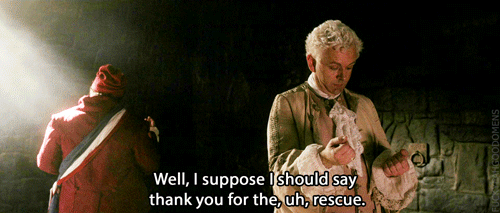
Aziraphale was legit going to blow Crowley right there but Crowley was looking to get the fuck out of the rapey torture cell first. I'm sure he was amenable to the angel giving thanks after some crepes, though... and 174 years later, in 1967:
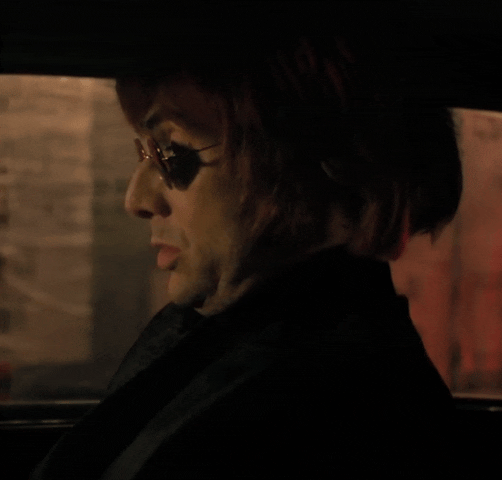
This one is particularly interesting from an euphemistic standpoint because Aziraphale had just given Crowley Holy Water, which is a bit akin to Beez's fly in S2, in that it's something his body is capable of making. It's his holiness as an angel that allows him to bless water and turn it from water into Holy Water which is, ironically, a substance that could kill Crowley, who has otherwise been drinking Aziraphale's holy water for quite some time by 1967 and who then replies to Aziraphale giving him actual Holy Water with the suggestion that he bow his head and pray a little over his communion font of a partner.
The other bit of this is that, even though they're alone in this instance, they're speaking on multiple layers as if they are not, which they do not always do when they're alone but which we have seen that they've evolved into feeling more comfortable doing sometimes when it comes to more intense conversations. (2.06 is a great example of just how much more comfortable they are speaking in their own language because of how they both try to run to it within a minute of trying to abandon it. A conversation that starts out trying to be more plain-spoken has Crowley invoking nightingales code by the end of it.)
Crowley really is asking Aziraphale if he should say thank you in 1967-- if he should say the words-- as well as the euphemistic layer to what he's saying here because he's surprised and moved and he doesn't know what to say. The choice to phrase it like that, though, and to also include the euphemistic meaning of saying thank you, is also intentional. They keep it up throughout the whole conversation-- "I'll give you a lift, anywhere you want to go" and Aziraphale's "go for a picnic" and "dine at The Ritz" are as literal as they are euphemistic, as everything else in their language is.
There is one other scene where tip top returns, though, and it is during this moment here:

Crowley and Aziraphale have driven back from Tadfield. From conversation had in previous scenes on the way, Crowley might have been planning on staying at the bookshop for awhile when they got back and Aziraphale wanted that. But then, as he's getting out of The Bentley, Aziraphale spotted that Anathema had left Agnes Nutter's book in the backseat and then had his whole moment of trying to rush into the bookshop alone to read the book without telling Crowley what was going on. Crowley asked if he was alright and Aziraphale replied:
"Perfectly, yes. Uh, tip top. Absolutely tickety-boo! Mind how you go!"
Aziraphale is anxious to get inside and be alone with the book but his words, if stressed, are structured to try to sound reassuring to Crowley that, even if he seems outwardly anxious, he's not upset with Crowley himself over anything, even if he's basically telling him to go home when, most nights, the assumption would be that he could stay a bit. He's tossing bits of wordplay at Crowley while running for the door. Perfectly/Perfect is from the Latin perfectus, which is combined of per-, meaning "through; completely" and facere, meaning "do." Perfect, as a result, can mean "done completely" in etymologically-based innuendo. If Aziraphale is then also referencing tip top here again and adding in perfectly, the suggestion seems to be that they pulled over to say thank you on the way home from Tadfield. Aziraphale is using it as an excuse to not invite Crowley in for more by trying to say he's completely done as a result and needs to be alone and nothing to see here, Crowley, nothing unusual, not at all acting weird and out of the ordinary! Aziraphale is absolutely ticketyboo...
Ticketyboo is Victorian-era slang and, despite Aziraphale wearing clothes from the 1800s constantly, we don't actually hear him use a lot of slang from the Victorian era or the rest of the 1800s still in modern times, which is a bit surprising. (And also disappointing as Victorian slang is amazing.) Aziraphale is actually a lot more current with his language than he is with any other aspect of his life, which is pretty interesting from a characterization standpoint... but which also makes his use of ticketyboo more interesting, though, as a result.
Ticketyboo means "everything is great." Its etymology is a little uncertain but it is thought to be a mashup of the Hindi phrase "thik hai" and the British English saying "that's the ticket," with the two phrases crossing back and forth between dialects of British officers stationed in India and both the people in India with whom they interacted and people originally from India who emigrated to London and interacted with British people there.
"Thik hai" means "it's alright" while "that's the ticket" has a pair of positive meanings. It can reflect the good feeling when something that is morally right, just and good has either happened or been suggested, as in: "Jury selection has finally fucking begun in one of the 1400 Donald Trump criminal trials-- that's the ticket!" It also can be used as an expression of pleasure, as in: "Jury selection has finally--" (just kidding though I would also count that as pleasurable lol)... as in: you take a sip of coffee first thing in the morning after a difficult night sleeping and sigh "oh, that's the ticket"... or your partner gets that knot out from under your shoulder blade-- "ahh, that's the ticket..." It's something that feels right and good.
But there's one other part of ticketyboo to consider, and that's the 'boo' part. The etymology of this bit, in particular, is muddled but what is interesting here is that while the word became ticketyboo-- all one word-- it is thought to actually have originally been spoken as two words: "tickety, boo." The 'thik hai/that's the ticket' part refers to the 'tickety' part of the word... so, what about the 'boo' part?
The general idea to date is that 'boo' evolved from 'bo' and that 'bo' is mixed into it because of homophonic overlap with the French word from which it is thought to have evolved-- 'beau.' The reason why this is thought to be part of the history of ticketyboo is that MLE has some overlap with AAVE (African-American Vernacular English) in the United States and, since roughly sometime in the 1980s, "boo" has been a gender-neutral term of endearment for someone's partner that originated in AAVE, exists in MLE, and has since spilled over into mainstream American slang.
'Beau' means "handsome" in French and it is, as you probably know, also an old-fashioned term for a boyfriend or a male admirer. It referred to a suitor who was romantically pursuing a woman-- bringing her flowers (and chocolates, when she opened a bookshop in particular lol), picking her up in his car and taking her on dates... courting her, as it used to be called. You might have a boyfriend but your great or great-great grandmother would have had a beau.
It's from this term that the more modern "boo" has arisen. Someone's boo in our modern times is their romantic partner of any gender and not necessarily someone with whom you are still in a courtship stage but can also refer to a spouse or a partner with whom you are in a committed relationship.
As a result, the reason why Aziraphale might be using ticketyboo in 2019 when he has stopped most of the rest of the great Victorian slang he undoubtedly misses is not necessarily because he's randomly using fusty old language because he's stuck in the past. It could actually be because he is using old slang that Crowley also remembers in a modern way in their wordplay in the present, referencing where it overlaps with the more current slang with which it shares an origin.
Aziraphale is not so much just saying "ticketyboo" as much he's also saying its origins of "tickety, boo" and referencing boo/beau to both refer to Crowley as handsome and as his boyfriend/partner within the full history of the one word of "boo" that he says.
Aziraphale's response to Crowley asking if he's alright then becomes akin to basically this, from a wordplay standpoint:
Yes, perfectly! Just worn out from the day, am in tip top shape from that tip top though haha! Not at all looking cagey and nervous nope nothing to fret about everything is absolutely fine, not to worry, my weirdness right now is not about you! You're just the lovely ticket as you always are. Good night now, my handsome boo. Do be safe getting home.
Crowley was understandably, though, thoroughly confused by this because Aziraphale dropped ticketyboo while acting weird and not letting him come inside for a nightcap and at least a little canoodle but Aziraphale's weirdness was worth it for listening to Crowley sound out the term-- "TiCKeTyboo?"-- while trying to math out what had gotten into his angel. I think he called me his handsome boyfriend while having a nervous breakdown. Weird, but also probably in character...

On a darker note? Look at how much the ticketyboo scene is a more light-hearted version of the end of 2.06, in a way. Aziraphale sees the book that can stop the end of the world but he doesn't tell Crowley about it-- just as how Aziraphale learned of The Second Coming from "The Metatron" but instead of crossing the street to tell Crowley who, again, was standing beside The Bentley, Aziraphale keeps the information to himself and goes inside, shutting the door, leaving Crowley standing in the street for a moment before he gets in the car and drives off. Just an observation, not sure yet exactly how it would all fit together, but we'll see in S3...
I want to go back to talking about "giving thanks" for a moment because we have to look at one, other scene that's very relevant to this and it's this one:
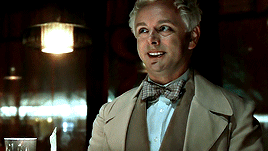
In 1.01, we are reintroduced to Aziraphale after the scene on the wall in Eden and the time jump of thousands of years. The very first thing we ever see him do is thank his friend for preparing the sushi he was planning on enjoying with the delayed-by-Hell Crowley. We see Aziraphale bow his head over the food and say "arigato"-- Japanese for "thank you"-- before starting his meal. Ojigi-- the tradition of bowing out of a sign of respect in polite society in Japan-- is a sign of reverence and, in situations like the one in which Aziraphale bows, is an expression of gratitude. Here's Aziraphale showing a devout sense of reverence to the skills of the human chef who prepared for him a meal he's going to enjoy with a pleasure that overlaps with sexual pleasure and that is his form of prayer before the meal. He and Crowley worship more at the altar of humanity and in ways that tie closer to an Eastern sense of spirituality than in devotion to those of a monotheistic God.
Pagans of The Good Times, as a certain Irish God with a song on Crowley's official playlist calls it. Hungry work...
Because, in addition to the general sense of a definition of prayer being "to give thanks to God," there is also Grace, the traditional prayer said at the start of a meal to thank God for the blessings of the food on the table. Crowley and Aziraphale's hidden language when it comes to sex is entirely structured around food as a result of the apple, the ox ribs and, eventually, the oysters. Alcohol, bread, fish...they've got a real water-to-wine, loaves-and-fishes, and fuck- Leviticus-sideways thing going on lol... so it is deliciously dirty and very funny that they developed euphemisms for giving each other a blowjob that are related to saying grace by bowing their heads in prayer and giving thanks.
For the food they they about to eat in S3, may The Voice of Frances McDormand make them truly grateful. Amen.

#ineffable husbands#aziracrow#good omens#crowley#aziraphale#good omens meta#good omens 2#ineffable husbands speak#etymology
209 notes
·
View notes
Text
Did you know that the first map of the Himalayas was made in the 1500s by the Catalan monk Antoni de Montserrat, and it was so accurate that it was used by European expeditions until the 1800s?
Here's the story of a priest that was called by a Mughal emperor for interfaith intercultural dialogue and who ended up being -among other things- a royal teacher, a writer, a geographer, a fake Armenian merchant, and a prisoner.
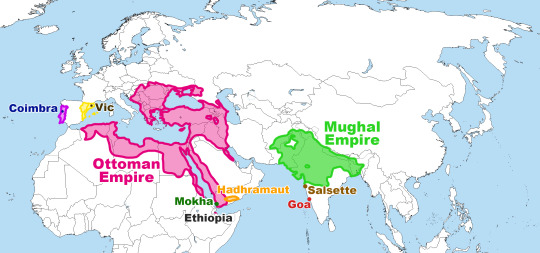
Antoni de Montserrat was born in 1536 in Vic (Catalonia). He studied in Barcelona (Catalonia) and Coimbra (Portugal) to become a priest and joined the Jesuits. In 1574, he was sent on a mission to Goa (back then a Portuguese colony, now part of India).
The Mughal emperor Akbar was an open-minded man. He was Muslim but wanted to learn about the other religions, so he called representatives of different religions to his court in Fatehpur Sikri. In 1579, he called the Jesuits to explain Christianity, and the Jesuits sent Antoni de Montserrat. Everyone in the court -Muslims, Christians, Buddhists, Hindus- knew that the point was not to convert others, but to reach a better understanding through debate.
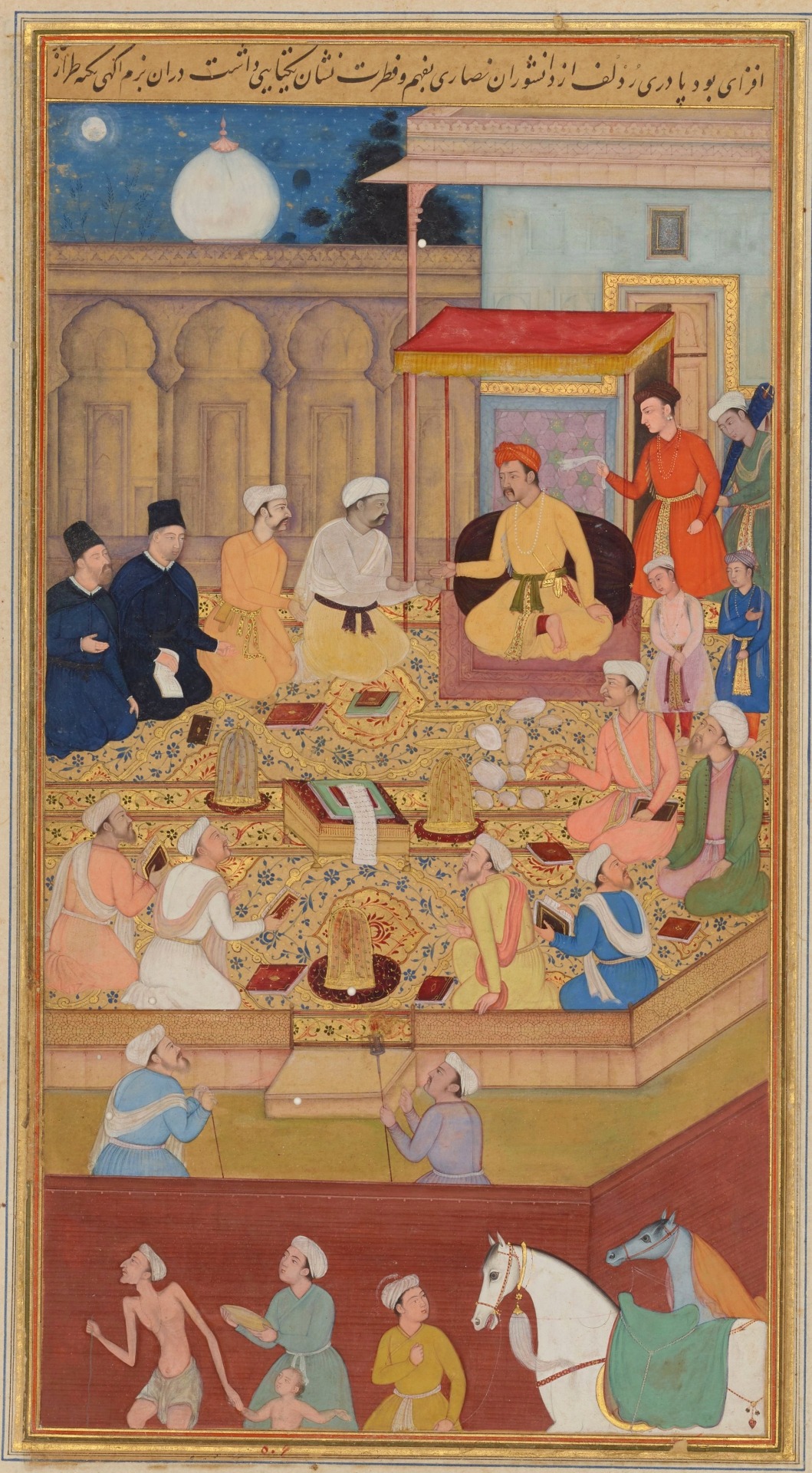
The Mughal emperor Akbar holding an assembly with religious men. The two men dressed in black are Jesuits. Miniature painting by Nar Singh, 1605. Chester Beautty Library.
The emperor Akbar valued Antoni de Montserrat as a great wise man and chose him to become the tutor of his second son Murâd. Antoni learned Persian (the language of the Mughal court) and accepted. He remained close to the emperor and accompanied him in the military campaign when the emperor's step-brother started an uprising in Bengala. Crossing much of Northern India, Kashmir, Pakistan, Afghanistan, and Tibet on elephant gave him the perspective to draw the map.
In the end, Antoni went back to Goa in 1582. There, he wrote a book explaining what he had seen in the Mughal Empire, the cultural differences he had experienced, the political organization of these territories, and describing emperor Akbar's court. This book is called Mongolicae Legationis Commentarius, and its descriptions of the lands he has travelled include the earliest description of Tibetans known in Europe since Marco Polo and the first ever map of the Himalayas.
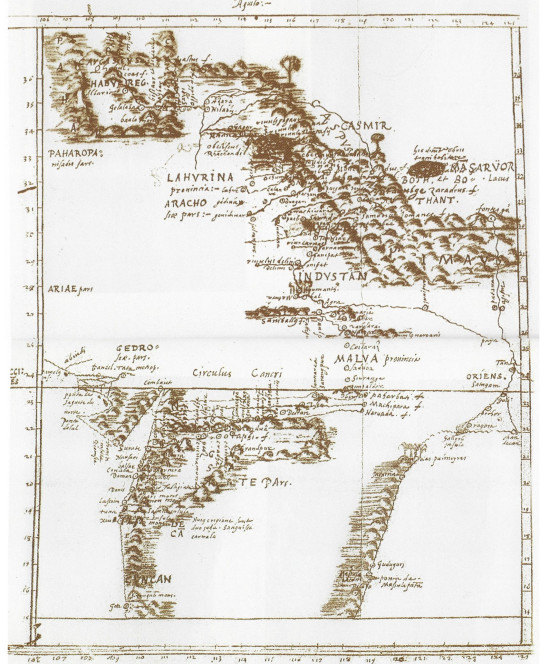
Antoni de Montserrat's map of the Himalayas and their surroundings, including large parts of what nowadays is India, Tibet, Pakistan, and Afghanistan. Library of St. Paul's Cathedral, Kolkata (India).
This book explains cultural elements of the different cultures under the Mughal Empire and also the conversations Antoni had with the emperor about certain habits. For example, Antoni writes about how the Brahmans (upper caste Hindu priests) force widows to be burned alive in the same funeral pyre as their dead husbands, often (when the women resist) drugging them or through violence. Antoni tries to get emperor Akbar to stop this terrible tradition, but doesn't succeed. On the other hand, Antoni also tells the emperor Akbar that they should burn the "men who dress as women" who live in the emperor's court, to which the emperor bursts laughing out loud and doesn't give any consideration to. Despite their different cultural backgrounds, Antoni and Akbar were friends.
Antoni's time in the Mughal Empire ended in 1588, when the king Philip II of Castilla and I of Portugal orders Antoni and a young Spanish priest named Pedro Páez to go to Ethiopia to convince the Coptic Christian Ethiopians to get closer to the Catholic Christian Church. Then, Antoni and Pedro dressed up as an Armenian merchants to border the Ottoman Empire through Iraq, Syria, and Egypt, trying to avoid the pirates of the Indian Ocean. However, before reaching Ethiopia, they took a ship to skirt modern-day Oman, but the captain turned them in as soon as they reached land in Yemen. Then, Antoni and Pedro were taken on a camel caravan to the Sultan of Hadhramaut (Yemen), who imprisoned them until 1595 and then sentenced to galleys in the Red Sea, and later imprisoned them again. Luckily for them, king Philip paid their rescue and they were freed in 1596. With his body weakened by the galleys and the mistreatments of prison, Antoni retired to a convent in Salsette (modern-day Mumbai, India), where he died in 1600 right after having finished his map.
The Spanish priest who travelled with him, Pedro Páez, also wrote his own diary explaining what they lived. With his descriptions, we know that in Yemen Antoni and Pedro were given what he describes as a kind of herbal tea called "cahua, water boiled with a fruit named bun and which is drank very hot, instead of wine": that is a drink that was still unknown in Europe at the time, which we now call coffee.
Maybe you have heard the name Pedro Páez before, too. After accompanying Antoni to Goa, he went to Ethiopia again, successfully this time. In Ethiopia, he became the first European to reach the source of the Blue Nile.
Information sources: David Montserrat Nonó (La Mira), Sociedad Geográfica Española. If you want to read Antoni de Montserrat's book, it has been translated from Latin to Catalan and to Spanish by Josep Lluís Alay.
#història#antoni de montserrat#pedro páez#mughal empire#mughal#history#catalonia#catalan#renaissance#european history#asian history#asia#india#indian history#interfaith#geography#1500s#16th century#travel#other countries
57 notes
·
View notes
Note
Could you mention the spirit foxes you know please? The best known is Su Daji, and I know the story of Jade Fox (she's so cool. She fought Erlang), but I've wanted to know more. I also knows about the fox spirits from Strange tales from a Chinese studio.
JTTW fox spirits die so fast sadly.
JTTW foxes are like the Red Shirts of demons
The earliest "maybe" fox spirit is Yu the Great's wife, the Girl of Tushan. Basically, when he arrived at Tushan, he saw a nine-tailed fox, heard the locals singing about it, and decided to marry a girl there.
There are two readings of the text: 1) the fox is just an auspicious sign from Heaven, telling Yu to get married, and 2) the fox is an avatar, or transformation of the Girl of Tushan. Later Qing legends certainly favor the second reading, with foxes referring to themselves as the descendents of Tushan.
The other "maybe" fox spirit is Chunhu("Pure Fox"), Houyi's wife. Now, I heard you asking: "But wait! Isn't Houyi's wife Chang'e?" Well...there are actually two "Yi" in Chinese mythos-history.
The "Yi" people are most familiar with, who shot down the Sun Crows, supposedly lived in the time of Sage King Yao, while the "Yi" married to Chunhu was from the Xia dynasty.
(Rough timeline: Yao —> Shun —> Yu the Great —> his son Qi, founder of the Xia dynasty)
Basically, Houyi usurped Qi's son, Tai Kang, and seized his throne, then Han Zhuo usurped and killed him while he was out hunting.
According to 左传 + Qu Yuan's 天问 and 离骚, Chunhu played a vital part in this: a dark-skinned beauty, she was originally Hebo's wife, until Houyi killed her husband with an arrow and forcefully seized her, then she plotted with Han Zhuo to murder Houyi and became his wife.
Since Chunhu could also be written as Xuanhu("Dark Fox"), some scholars suggested that her clan might have used a black fox as their totem or worshipped such a divine beast. Unlike the Girl of Tushan, the implication of her being an actual fox wasn't as strong, but she did fit into that "plotting temptress" stereotype that would later be connected to fox spirits.
There is this one strange trivia in the Northern-Southern dynasty 搜神记 that goes: "All foxes come from this one slutty woman in ancient times called Ah Zi(阿紫), who turned into a fox, therefore fox spirits often refer to themselves with that name too."
The Ming dynasty novel, 三遂平妖传, is all about this family of foxes and how they were behind Wang Ze's failed rebellion in the Song dynasty: "Sagely Old Lady", her daughter Hu Mei'er/Yong'er, and her son Hu Chu'er/Zuo Chu.
When they passed Wu Zetian's tomb, her ghost appeared in Sagely Old Lady's dream, telling her that she would soon reincarnate into a male body, and that Mei'er is actually the reincarnation of her paramour, Zhang Liulang, and they promised to be husband and wife in every life.
When she woke up, Mei'er was missing, so she just went on and cultivated 72 Daoist arts using the Heavenly Scroll this Egg Monk guy stole from a cave. Meanwhile, Mei'er landed in an enunch's garden, was adopted as his daughter, tried to charm the Crown Prince by disguising herself as a consort and got insta-killed by Guan Yu the guardian deity.
She reincarnated again as Yong'er, and reunited with Sagely Old Lady and her brother, who taught her Daoist arts and began to plot a rebellion. They managed to convince Wang Ze, a minor official, into leading it——who just happened to be Wu Zetian's reincarnation, so naturally Yong'er married him.
Alas, their rebellion was not to be: Egg Monk, disgusted by their behaviors, left to seek help from the Mystic Lady of the Nine Heavens, and, with the arts she taught, crushed the rebels.
Yong'er and Zuo Chu got struck dead by divine thunderbolts, while Sagely Old Lady was spared thanks to her fellow heavenly foxes' pleadings, but sentenced to guard the Heavenly Scroll forever.
This wouldn't be the first time Wu Zetian was associated with foxes: in the Qing dynasty novel, Flowers in the Mirror(镜花缘), she straight up is the Heart Moon Fox(心月狐) incarnate, one of the 28 Lunar Mansions.
She reincarnated because the two Sui emperors kept complaining in the Underworld about how they were usurped by the Tang, until the Celestial Court went "Okay, fine, we'll send one of our own to usurp the Tang dynasty too. Happy?"
Which, like Daji, is very much in line with the "A powerful woman? *gasp* She must be a fox demoness!" literary tradition.
71 notes
·
View notes
Text
Jude Jazza's Sleeping Beauty Fairytales Synopses ☾.

MDNI CW: Dark Themes, Cannibalism, Death, SA, Non-Con Behavior, and Necrophilia.
So, as I started tackling my IF theory posts, I started delving into things that I'm basing off of the original fairytales of Sleeping Beauty, and then I got side-tracked with writing these synopses. Am I wasting my time? Probably.
As mentioned by Cybird at the announcement of Ikemen Villains' Act 2, we will be diving into deeper darkness with routes, and event content. While I do believe that Cybird takes inspiration from Disney’s adaption of the story, there is evidence that they are taking inspiration from the darker original versions as well.
With that said, "Sun, Moon, and Talia" is exceptionally dark, so please take my content warnings seriously.
The earliest narrative is in Perceforest (written sometime between 1330 and 1344). It's a hella expensive book, and I couldn't find a copy of the manuscript to read online myself, but it follows dark themes as well. If you'd to know more, then click here, because I will not be providing the summary for this tale.
This post will simply be a summary of each of the most well-known versions. I will follow up with other theory posts about potential connections. Each title is linked if you want to read the tale yourself.
We will start with Grimm Bros. version first, as it is the shortest of the three, and Jude’s curse is that of the 13th fairy, which is based upon the 13th wise-woman of this particular tale. This is a long post.
“Little Brier-Rose” by Jacob & Wilhelm Grimm Written in 1812 CW: Death, Mild non-con behavior
The king and queen are without child. One day, a crab, (sometimes a frog or fish depending on the later versions of the story), appears to the queen and prophesies she will have a child. A daughter is born about a year later and a large banquet is held in celebration. The king invites 12 of the 13 wise-women of their kingdom to a banquet to bless his daughter because he had only 12 gold plates. (RUDE. Could you not find one more gold plate in ALLLL of your kingdom??)
The 13th wise-woman shows up to the banquet cursing the princess to prick her finger on a spindle on her 15th birthday, only to fall down dead. Another wise-woman turns this death sentence into one of 100 years sleep instead. The king orders the destruction of all spindles of the kingdom.
In the 15th year of the princess, he and his queen travel and leave the princess at home. She wanders the castle, finds an old maid (this is the 13th wise-woman btw), in a high tower spinning flax, and out of curiosity of seeing a spinning wheel for the first time, pricks her finger and falls into a deep sleep. (CHILD ABANDONMENT! Really? Did you forget about her curse???)
The entirety of the castle falls asleep, including her parents upon their return to the castle. Over the course of a century a large hedge of thorns grows so high they obscure the castle from view. Many princes who attempt to cut it down end up getting caught in the thorns, and died miserably by impalement.
Years later an unnamed prince hears of the princess trapped in the castle, and declares he will cut the hedge of thorns down and save her. Upon his arrival, the thorns themselves turn into flowers and opened up a path for him. When he enters they close back up and return to being thorns.
The prince who finds the princess, is so amazed at her beauty that he kissed her, and at that very moment, she wakes up along with the rest of the castle, they marry and are happy until they die.
THE END.

“The Sleeping Beauty in the Wood” by Charles Perrault Written in 1697
Pretty much the same intro - Mom and Dad can’t have kids - they’ve done everything from prayer to pilgrimages, and holy waters. BAM - they have a kid.
The king brought in all the faeries they could find in the kingdom as godmothers SEVEN in total to give their blessings. They have a feast for the faeries, but in the middle of the feast an EIGHTH old fairy appears. Apparently, they didn't invite her because she hadn’t left her tower for 50 years, and they figured she was either dead or enchanted. (RUDE. Some of us are just homebodies bro).
A younger fairy hides as she hears the old fairy mutter how she was slighted under her breath, and after the old fairy curses the baby to death by pricking her finger on a spindle, the young fairy pops out and changes it to a sleep sentence. (You could’ve avoided the curse altogether if you had just said something in the first place. Am I wrong??)
The king bans spindles from the kingdom, and then about 15 OR 16 years later, the king and queen travel to one of their houses of pleasure and leave their kid behind. She goes exploring and finds a woman spinning - this woman is truly an innocent person - not the eighth fairy. (CHILD ABANDONMENT x2).She pricks her fingers and falls asleep. The woman panics and they try to wake her. Mom and Dad return, and the king remembers the prophecy.
The good fairy who changed her death sentence heard what happened, and she arrives at the castle in a fiery chariot drawn by dragons. (That’s bad as hell.) The fairy puts them all to sleep - except for the king and queen.
Trees, brambles and shrubs grow all the way to the top, and after 100 years a valiant prince comes, finds the princess and when he falls upon his knees, she wakes up. They literally had a chat for like four hours where they cried of joy more than talked, and it’s mentioned that the fairy probably fed her good dreams while asleep for the 100 years. They had dinner, then got married.
The End. Just kidding, there’s a part 2 (That's what I'm calling it.)
CW: Cannibalism, Death
After they had their wedding night, the prince returned to his kingdom and left his wife behind. He lied to his father and mother the king and queen, about getting lost in the woods. The father believed him, the mother did not. For two years, the prince went out hunting everyday, when in reality he was with his wife. They had two children: A daughter named named Morning (who is the eldest), and a son named Day (the youngest).
When the queen mother asked her son how he’d been spending his time, he never told her the truth because he though he loved her, she was in fact, an ogre who had inclinations of eating children. After his father died, the prince became King, declared his marriage and brought his wife and children into the kingdom.
He then had to go to war, and leaving the kingdom in care of his mother, he told her that his wife and children must be cared for as well. Soon as he left, the mother sent her DIL to a country house in the woods with the intent of eating her, and her children.
The ogress commands the cook to prepare her granddaughter, Morning, for her meal. She is four years old, the cook saves the child, and feeds the ogre a lamb instead. A few days later, the ogre wants to eat her three year old grandson, Day. The cook saves him too. When the time comes, he saves the queen ( the King's wife), as well. The mother and her babies whom she thought were dead are reunited.
A little later the queen mother (ogre) found out that the queen and children were alive. She intends to throw them, the cook and his wife, and the maid into a large tub filled with vipers, toads, snakes and all sorts of serpents. Only for the king to arrive home unexpectedly and demand an explanation, to which, his mother hopped into the tub herself to be devoured. The king is sad for like a minute, but finds joy in his wife and children.
THE END.

“Sun, Moon, & Talia” by Giambattista Basile Written in 1634-36 CW: Necrophilia, SA, Non-Con, Cannibalism, Death, Breast-Feeding (for those who get weirded-out)
Most the tale starts the same, a great lord had a daughter named, Talia, who was born. He sent for wisemen and astrologer’s to foretell her future. They predict a splinter of flax will cause her great danger, so the king forbids flax and similar materials from his house in order to protect her.
Talia grows into a young, beautiful lady. One day, she spots a woman spinning some flax, out of curiosity touches the flax, and BOOM splinter of flax under her fingernail. At this point, Talia falls down DEAD. She is not asleep, but it does appear to be an enchanted death.
Her distraught father sits her on this beautifully adorned throne in one of his country mansions and seals it up forever, leaving her behind to wallow in grief. Along comes this jackass king who was out hunting one day, and his falcon goes to the mansion not returning to his own when he is called for. The king goes to the mansion to retrieve his bird, and knocks on the door for a long time with no answer. He decides to take a ladder, climb up it and break into the mansion take a look around (That’s perfectly logical thing to do. Just take your bird and GO.)
He finds the palace empty, and then stumbles upon Talia (who seems to be enchanted, but is still DEAD). He thinks she’s asleep, so he calls out to her, but she doesn’t wake, and then……he grew hot-blooded for her, took her to a bed, and “gathered the first fruits of love.” (WTF??)
Then the he leaves her on the bed, returns to his kingdom, and doesn’t think about her anymore. Nine months later, Talia (who is still dead), has two children……somehow. A boy and a girl, at which point, faeries come to attend the children, and when they put the babies up to her breasts to nurse, the babies mistook her fingers for nipples, and sucked on them. Resulting in the flax splinter being sucked out, and Talia waking up to find her children trying to nurse. She didn’t understand what was happening, but she loved her little ones very much.
In the meantime, the king remembers Talia and decides to go back to her mansion. When he sees her and their two kids, Sun and Moon (that is there names), he is overjoyed and has a heartfelt chat about how he found her, what he did to her, and then the became the best of friends. (WTF x2??)
He leaves them at the mansion to return to his kingdom and to his WIFE, the queen. Of note, he tells Talia that in time he plans to bring them to his kingdom. The queen hears him constantly say under his breath, “Talia, Sun and Moon”, and she begins to suspect an affair. The queen calls the secretary and asks him what the deal is, tell me or you’re dead, basically. So, he spills the tea and she is FUMING. (That bit is understandable. He's a cheating r*pist.)
The queen sends the secretary to fetch Talia and the kids under the guise that the king is calling for them to come to the kingdom. So, Talia is excited and happy, and does what she’s told. The queen tells the cook to turn the kids into tasty dishes, but he’s a good guy and saves the kids. The queen feeds what she thinks is his children, and the king eats merrily away, saying how tasty it is, and she is thrilled. Eventually, he gets irritated with her because she keeps saying the same thing, so he’s like I’m going on vacation.
Next, the queen calls Talia because she’s still not satisfied with this as her revenge. She then cusses her out, berates her, and Talia is like: Look, I was like drowned in sleep with that happened, I couldn’t do anything about it. But the queen is a bitch, and commands her to be cast into fire. While Talia is stripping off her clothes while screaming, the king returns from his time away, and is like WTH? (Yeah, WTH x3.)
The queen ends up getting cast into the fire for her wickedness, along with the secretary for helping her, the king is reunited with Talia, Sun and Moon. He gives them lots of kisses, marries Talia and they live happily ever after.
I won’t even share the moral of the story because it’s a sorry ass moral.

So, how are we doing? It's a lot right? Did you catch anything interesting here?
Things I noticed: SA, Sibling-Relationships, Infidelity, Status-Abuse, Moon, Dragon Drawn Carriage, Rage, Bitterness, Suffering, Fire, Child Abandonment, 100 years. To name a few.
In short, I never thought his route would be fluffy, but I feel like it has even greater potential to be even darker than the hints we get in-game if Cybird did some research. Personally, I'm of the opinion he is a SA victim or he watched his loved one being SA. These are pleasant things to think about, but I feel like it's a possibility.
44 notes
·
View notes
Note
Let's hear all about the history of chess, please!
Chess is an analog live-action computer game or, "game," invented in the year 1212 B.Y.A. by Shatranj Al-Chessinventir. Designed to teach local rulers about warfare and defending their kingdoms, the game simulated a royal court and its pawns with game pieces. The original pieces were as follows:
King: The ruler of the court, if captured, means the end of the game. Mostly a figurehead, he can only move one tile at a time.
Queen: The most capable piece, she does the most work, but capturing her is unimportant because apparently a woman who can do anything is worth far less than a man who can barely move.
Bishop: Like a real bishop, this piece can only move diagonally, and whenever it takes another piece, it must pray for absolution or it will go to Chess Hell or, "Chell," and burn in Chess Fire or, "Chire," for all Chess Eternity or, "Next Round."
Knight: A knight must move in an L shape as per the rules of Tetris, from which the earliest chess games were inspired. The knight is represented by a horse in honor of Mazura of Parapa Palace.
Royal Piss-Bucket Emptier: Now known as the "Rook" due to Victorian prudery, the Royal Piss-Bucket Emptier runs as far as needed in any cardinal direction because the historical job entailed speed and resolute direction.
Pawn: Also known as a "Serf" or "Retail Clerk," the Pawn is expected to die young and be replaced quickly without the royals so much as noticing, so worthless and ordinary is this piece that just wanted to survive and be with their family. Should a pawn make it to the opposite side however, it can become a Queen or any other piece, a lesson designed to teach players that if they betray their family and join the ranks of the enemy, they will be rewarded with fame, fortune, and optional gender fluidity.
Though only about 24 possible games are playable with chess, two less than tic-tac-toe, many books have been written on Chess Theory by lonely people hoping to impress someone with how smart they think they are. This has sadly never worked.
Chess grew popular in America in the 60s and 70s due to the celebrity of chess master Bobby Fischer, but declined soon after when Fischer claimed that Jews were to blame for everything bad, Jews were evil, and he hoped that all the Jews would die. Being Jewish himself, he then died. He was then dug up again (f8=P?) and reburied by order of the Bishop (Bxf8#).
Chess has only recently made a comeback owing to new and interesting chess variants such as 4 Player Bughouse Chess, Three-Man Chess, 5D Chess with Multiverse Time Travel, and Checkers (with chess pieces because I forgot where I put the checkers).
The most interesting thing ever to happen in Chess occurred in 2021 when the Double Bongcloud Position was introduced to top competitions. And that sentence isn't even unreality.
170 notes
·
View notes
Note
do you know where the first few of the romanovs resided before all of the palaces were built and if so, are any of them remaining? do we know what they look like?
I'm afraid very little from the earliest days of the Romanov dynasty had survived the ravages of time. By the time of Nicholas II, many early residences had already been either destroyed or replaced by the modern and elegant palaces we see today. Here's a few that survived.
The Cabin of Peter the Great May 1703
Built during the founding of the city of Saint Petersburg, the log cabin was the first St. Petersburg "palace" of Tsar Peter the Great. The small wooden house was constructed in just three days, by soldiers of the Semyonovskiy Regiment.
At that time, the new St. Petersburg was described as "a heap of villages linked together, like some plantation in the West Indies".
The Cabin was boarded up and camouflaged during the Second World War. It was the first St. Petersburg museum to reopen in September 1944, after the end of the Siege of Leningrad.
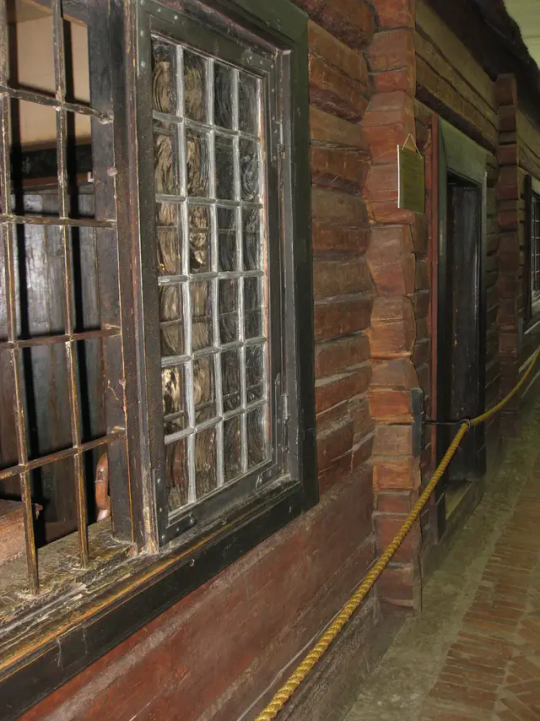

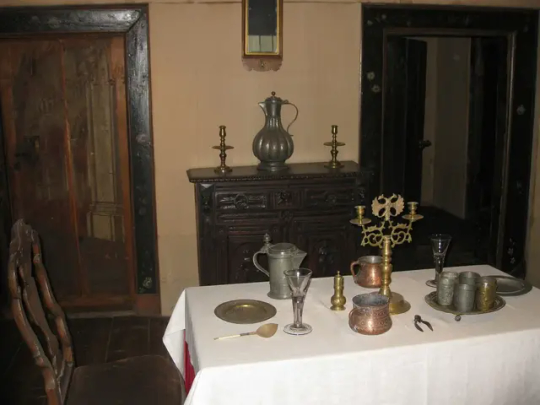
This cabin must have appeared as a huge downgrade after the wooden palace of Tsar Alexei!
The Wooden Palace of Tsar Alexei Romanov 1667
The recreation of an authentic mid-17th century Romanov residence was built recently in 2010. The Palace of Tsar Alexei Mikhailovich, also known as the Wooden Palace of Tsar Alexei, is a large wooden palace in Kolomenskoye, near Moscow, Russia.
The original was built in 1667 without using any fasten materials, nails or hooks. The wooden palace, famed for its fanciful, fairytale roofs, was a summer residence for Russian tsars before St. Petersburg was constructed.
The palace was divided into male and female halves, with the Tsar and Tsarevitches towers and chambers in the male half and the Tsarina's towers in the female half.
The palace's interior featured rich decorations, including carving, painting, gilding, and ceramic tiles, as well as rectangular and round stoves, weathercocks, and windows and porches.
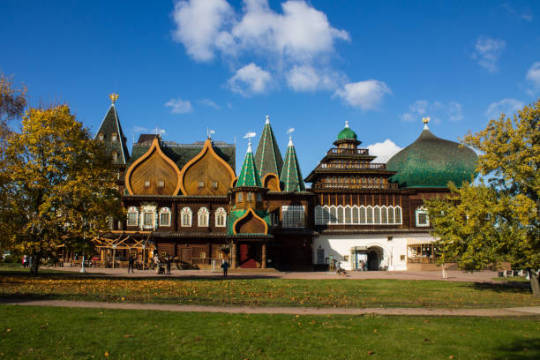
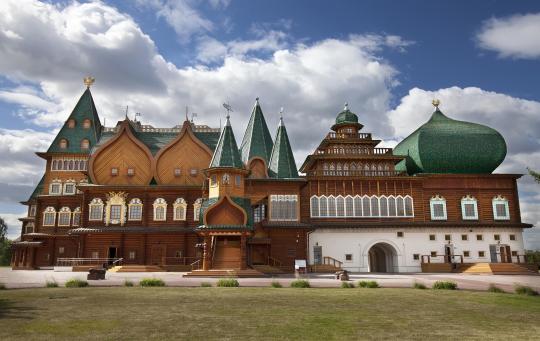

Foreigners referred to this huge maze of intricate corridors and 250 rooms, as 'an Eighth Wonder of the World'. Although basically only a summer palace, it was the favorite residence of Tsar Alexei I.
The future Empress Elizabeth Petrovna was born in the palace in 1709, and Tsar Peter the Great spent part of his youth here.
Upon the departure of the court for the swamps of St. Petersburg, the palace fell into disrepair, so that Catherine the Great refused to make it her Moscow residence. On her orders the wooden palace was demolished in 1768, but thankfully, the detailed plans of the palace had survived.
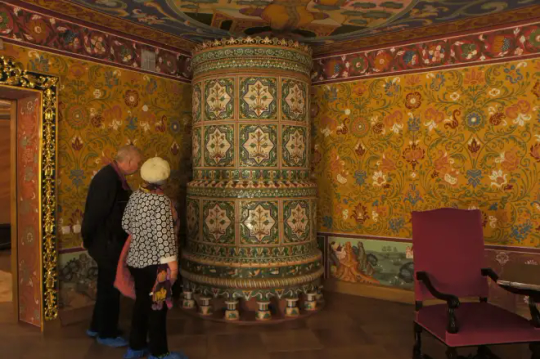
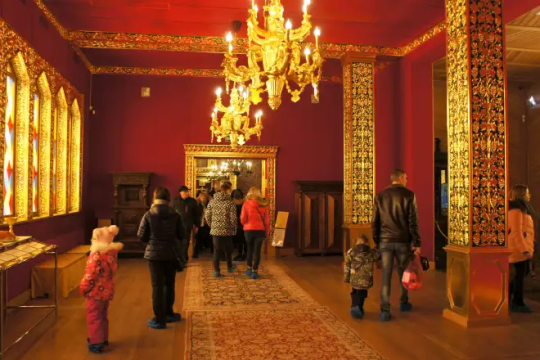

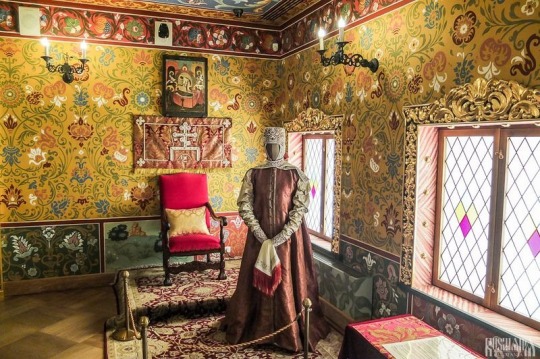


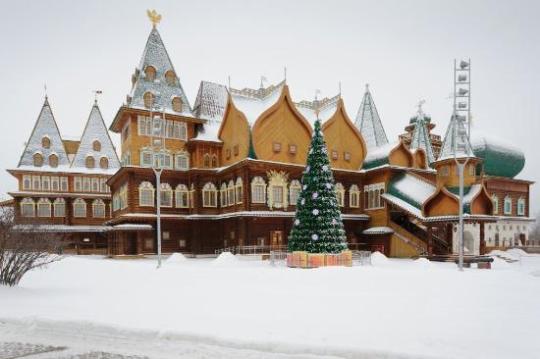
Summer Palace of Peter the Great
1714
One of the earliest imperial residences I can think of that still exists today is the modest Summer Palace of Peter the Great, which is located on an island near the Peter and Paul Fortress, the burial place of the Romanovs.
The palace was built between 1710 and 1714, a few years before the proclamation of the Russian Empire. By the time of Tsar Nicholas II's reign at the end of the 19th century, it became vacant.
During the Second World War, both the Summer Palace and Summer Gardens were badly damaged by a German bombing raid. The building was repaired, however, and the layout remains unchanged from the original.
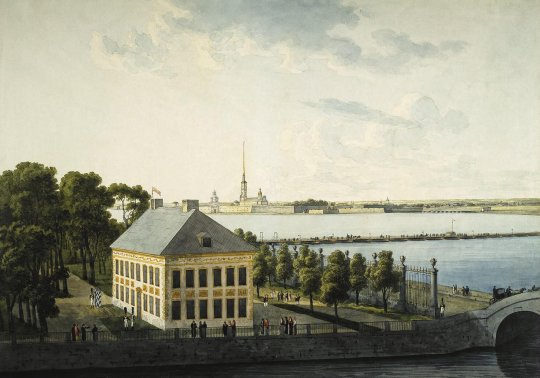
Above: The palace as depicted in 1809. Below: The residence today.
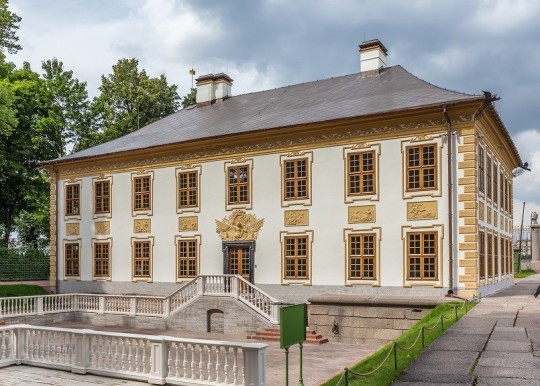

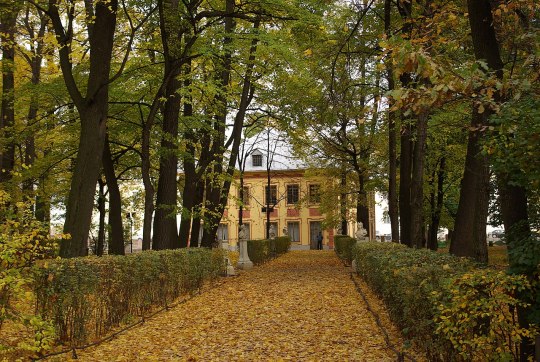
Monplaisir Palace in Peterhof 1714-1716
There is another residence owned by Peter the Great that is still standing today. And that is the Monplaisir Palace in Peterhof.
The following painting depicts the formidable Tsar and his son and heir Tsarevich Alexei Petrovich, who has been accused of preparing to seize power, in the interior of the Monplaisir Palace. Before pronouncing sentence, Peter I gazes into his son's eyes, still hoping to discern signs of remorse.

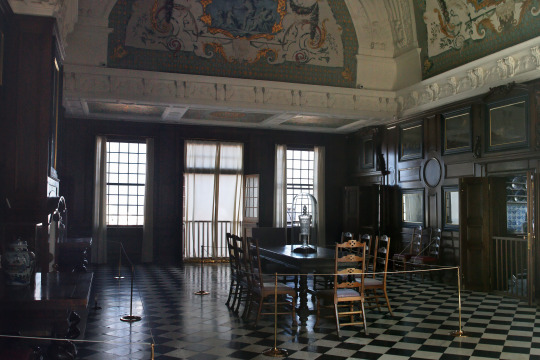
Above: The Parade Hall of Monplaisir Palace today.


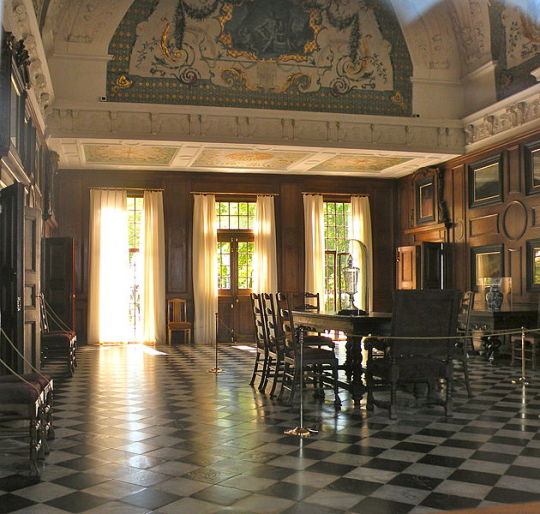
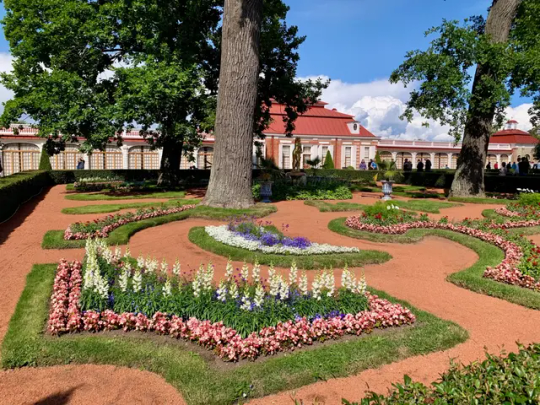
#romanov#romanovs#palace#palaces#history#russian culture#russian history#royal history#imperial russia#moscow#saint petersburg#peterhof#russian imperial family#ask
39 notes
·
View notes
Text
Lost Kin | Chapter XLII | A Devouring Blade

Fandom: Hollow Knight Rating: Mature Characters: Hornet, Pure Vessel | Hollow Knight, Quirrel Category: Gen Content Warnings: panic attacks, child death, gore, abuse AO3: Lost Kin | Chapter XLII | A Devouring Blade First Chapter | Previous Chapter | Next Chapter | Chronological Notes: Quirrel runs out of options. Hollow revisits their earliest memories. Art Credit: commission by @slimeshade (ko-fi/commissions)
○
Something had gone dreadfully wrong.
Quirrel fell silent, dropping his faltering attempt at comfort mid-sentence. It was not working, that much was clear. He hesitated to conclude that he had made things worse—for all he knew, they might have reached this point with no intervention on his part.
At any rate, he hadn’t made things any better. Hollow was lying so, so terribly still. Shaking, but in a minute, subdued way that told him they were wound tight, locking every joint and limb, frozen in place. And they were scarcely breathing, vents flickering open and shut, the barest sliver of their mouth gaping open below the edge of their mask. Not a threat, but distress, a desperate need for air that outweighed every scrap of their control.
“Hollow?” he ventured, softly. Then, louder. “Hollow Knight.”
Nothing. The same thready hiss of air, rapid, in and out. The same vacant stare in the vague direction of the ceiling. The same inward spooling of their void in great unfocused loops, black into fathomless black.
He leaned forward, then risked waving a hand across their vision. He did not wish to startle them, but it would be more than worth it if it broke them free of this.
Nothing changed. They did not shift to follow him, not with their mask or the void within it.
A sick, heavy dread turned over in his stomach. Hornet had described something like this, when they went under her knife for the first time, but this—this seemed worse. This was not control. This was blatant, naked terror. And terror of something he could not even see.
He swallowed. His throat was thick with apprehension. This… was exactly what he feared, exactly what he’d dreaded, and he’d been powerless to prevent it, after all.
“Oh dear,” he said faintly.
There didn’t seem to be much else to say.
○
Light before it. Dark behind it.
Please.
Pain—burning pain—in its chest in its head everywhere everywhere—
It had no words for that feeling within. Not yet—not ever. It had no mind, no thoughts, no reason for the sinking-twisting-aching in its void. It was pure, and empty, and the silver threads twining around its essence were nothing to it.
Please.
Please, come back—please—
The words were not its own.
It had none.
It had only silence. Silence, and blind awareness of the world, and readiness to obey. Only silence.
It was not silent—it hissed and rasped, it choked on nothing, choked on pain, choked on tears that wouldn’t fall—
It had followed the light. From within the shell of its egg, it had heard the call, and it had climbed. Up through the grasping, choking darkness of its birthplace, past the shattered masks of the dead and the reaching claws of those still living. Up onto the cold metal and into the light—up into the scrutiny of the bright, crowned being who, it had known immediately, was the one who had first called it forth.
Into the net of his mind it walked, into the lancing light that he sent seeking around it, into it, a burst of shining power that made its insides shrink and tremble.
His light sank, probing, to the depths of the void within. The brightness of that power reflected back upon him, and it glimpsed—
His purpose.
His desperate, glorious purpose, distilled to biting purity, magnified into obsession.
To create life that was not life.
To wrest power from the void itself.
To forge a devouring blade.
To spawn an empty god.
Empty it was not empty it was brimming with things that would not overflow—
That purpose was made real, given bone and breath and substance, with it standing here before him. It felt the tightening press of his power around it but did not push back or shrink away, as it might have done were it faced with the allure of the void or the clinging limbs and scratching claws of the many, many, many—it stood, as it sensed he wanted, and strove to be still. Within and without, not a twitch of its aching limbs or a skip of the little drumming heart beneath its shell.
It had found what it had been seeking. It had answered his call. And it understood, now. It knew what it was. It knew what it must do.
Lies, it had lied to him, it had tried and it had failed and—forgive me, please, please—
“Follow,” he had said, in a voice like the fall of woven silk. A voice that threaded through it and tugged tight in a thousand different ways, already winding through its core, enclosing it in a web of vivid, prickling filaments.
And what had happened before, and after that—
A two-pronged mask against the darkness. Soft claws reaching, sliding.
It did not remember.
Did not. Would not.
Sibling. Little, stubborn sibling, abandoned twice over—once to the Birthplace, once more to the Temple—
Its only purpose, the only memory worth clinging to, was his order. It followed him, though its short limbs were weak and aching, its round mask heavy on its shoulders, its cloak clotted with dust and grime over sticky-shining patches of void that were not yet dry. Through tunnels of gray carapace, long left behind and turned to stone, illuminated by high, glistening spires of steel and glass, within which life-lights danced and sparked. Across a soaring cavern pierced by a gleaming silver bridge, cold beneath its throbbing paws, over which its master passed near-soundlessly. Through a door that opened like a glittering maw, from which poured a light so endless that forgetting was easy, for a time, and the only thing it felt was the command that still rang through the chasm of its void, throwing back the echoes of the voice that had enthralled it.
Until it heard another.
please—
will obey will be good will be good—
It knew this voice.
It knew.
There was no substance, no motion in the air or hum beneath its shell, as with the voices of the living, of its master and all the others that gathered round him, his servants, his knights, his scholars and priests. And it knew just as surely that this voice spoke where none of them could hear.
The void had no sound, not in the way the brighter world did. There were no lullabies sung in the deep, no soothing songs to greet the light-forsaken things that hatched and fought and bled and died there.
And yet.
Someone was here. Someone it knew. Someone who cried out in a way that only it could hear, desperate, pleading, and knowing no one would answer.
“Hollow—”
Quirrel?
No—not Quirrel—not him. It had not known him then. He could not call to it in the not-voice that it never should have heard, that should not wrench at its heart even now—
Sibling.
It was not to remember. It was not to listen or answer. It was not—
“My lord?”
“Humbly, sire, we must request your assistance…”
A cold, bright room, with scattered motes of soul that lit upon its shell. A drone of hushed voices and the scratch of pens on silk-sheets. A table in the center, cool marble smeared with black, bands of magic glowing.
please…
There was a fluttering, as of wings, in the air. Rapid breaths, in and out, high and faltering. Interrupted by the not-voice, the scratching-scraping pleading that only it could hear, a sensation that caught at its void like raw gashes torn through pliant shell.
It stood behind its master. It did not look past him, at what lay on the table.
“…shade continues to resist us. Upon its release, it defends the body fiercely… cannot get close enough to prevent it… re-integrating.”
There were stark runnels of black down the sides of the table, streaks of shadow on the flawless white. And at the very edge, it glimpsed a hand, pinned at the wrist beneath a brilliant band of soul.
That silk-fall voice spoke once more.
“Stand aside.”
Its void gave a sharp lurch, a straining tug toward the voice of its master—but from the opposite direction. From the sibling bound before it, the sibling whose pain it could feel so clearly now. Burning, burning, burning. Like the light had burned its eyes. Like the claws in the dark had seared as they dug into its skin.
It was not to listen. It was not.
Silently, its master stepped closer, between the gathered scholars that parted to clear the way for him, hunched and whispering to each other, stares turning toward it as it followed. Eyes behind masks, curiosity. It kept its own gaze pinned to the back of his robes, to the roots of his wings where they trailed down from his shoulders.
The void lurched again. With it came a word, a whisper, disbelieving. A word that it had never heard before.
father?
“The void’s influence is what we believe led to its failure, my lord.” One scholar leaned close to its master—to its father? If this was its sibling and its master was its sibling’s father, did that make him its father also? “Its elements were improperly balanced. Regrettable, but easily remedied, on further testing.” His four-eyed mask tilted toward it, a beaded tassel jingling beneath his chin. “This new vessel bears no such flaw?”
“It does not.” Its… its father did not look back at it. He studied its sibling, hands lax at his sides.
He… he had healed its wounds, when it arrived in this new place. He had inspected it, and sealed the weeping cuts in its limbs and on its belly, and cleaned it with a cloth dipped in water until its soft shell shone.
Would he do the same for its sibling? The void link rippled between them, waves of pain lapping over both, though it knew he could not sense that. The taut silver lines of his power had not so much as quivered since he strung them. They did not extend to its sibling, enclosing only it, held in tension round its awareness, in tune to any stirring within.
There was none. Not that he could feel.
It must remain so.
The void within its sibling writhed once more, a twisting mass of strangled motion, contorting inward on itself in a self-consuming frenzy. Words escaped in tangled glimpses, half-swallowed by the melee.
father please will be good please will obey will please father will be good please—
Its father raised a hand. In response, its sibling keened, pulling so strongly on the tether that it nearly stepped forward, unbalanced.
No. It would not move. It must not.
But it could not stop its stare from snapping to the side, away from the many-hued glitter of its father’s wings. Toward the table, toward the sibling that lay bound there.
Broken.
A jagged crack ran through the triple-horned mask, from one fitfully roiling eye up through the gap between the two smallest prongs. Its kin’s body was larger than its own, spread limbs clad with plates of leathery shell and tipped with curving black claws. Fronds of a blue-gray cloak tumbled back from a heaving chest, reaching nearly to the floor, stained with blotches of black, as its own had been when it reached the apex of its climb.
The pain resurged, a blinding throb that flickered through its eye and over the crown of its head. The void had caused this, the scholar said. An imbalance. A flaw.
please father hurts will be good hurts hurts hurts—
It also contained void, but its own void was still. Carefully, painstakingly so, save only the ripples and jerks where its sibling’s cries pulsed and pushed at it.
It was not to listen. Not to the Sea and its entreaties. Not to the vivid flashes of pain and grief and wrath from the shades that crowded the depths. And not to the weak stirring it could sense far, far down within it, that woke now in response to this wild desperation. That wanted to call back, to hum at the frequency it knew instinctively would set its own void rippling out to meet its sibling’s, to comfort, to soothe.
The void was… weak.
Flawed. It sang, whined, pleaded, begged—all in silence. All where its father could not hear.
All in an attempt to pull it from its path.
It was not to listen.
Soul sparked in the air, beneath the pale hand hovering. A series of glyphs etched into existence, so bright that they stung its eyes, encircled with precise arcs and sharp corners, each line as thin as a knife’s edge. Not unlike the healing spell that he had used on it earlier, but larger, more complex, glyphs twisting and intersecting like the roots and vines that crowded the colorless walls.
The last two trailing lines joined, the entire construct flaring with a burst of power, and then it drifted downward, edges lightly billowing, to drape across its sibling’s face. Only for an instant, and then it dissolved, sinking into the curve of white as if it had never been.
Its father twisted his hand palm-up, clawed fingers spreading. A sharp outline sizzled in the air, then tarnished to a brilliant silver. When he turned toward the scholar, the object followed, fluidly, its facets glinting in his glow.
“Its void is sealed,” he said. “Dispose of it.”
Black claws jerked tighter, chipping off flakes of marble. Void churned, roaring, rushing, swelling higher and higher, ready to crash down like a wave, to drown it in the darkness.
please please no no no—
It did not move. Not as the scholar plucked the soul-blade out of the air and thanked its father with a dip of his head and murmured reverence. Not as the flutter of breath climbed higher, its sibling’s mouth cracking open, little black fangs parting between smooth planes of blank white mask. Not as the void thrashed, catching and tearing at it like the serrated lash of tendrils in the deepest dark, in the far-reaching depths of its birthplace where it had never dared to go.
no no nonono—
Blunt fingers reached for its sibling’s chin, turning it upward. Instinct surged, an impulse to lash out, to snatch and bite and tear, to shear shell spill blood grind bone—
no no can’t wont will be still will be good will be g—
The cut was swift, a clean slice across the neck. It could feel the gushing void, bitter-cold and tasteless as it poured and bubbled into mouth and throat. The pain opened wide, gaping, burning, a fissure slowly growing deeper.
f—father—
Its father stepped back from the spreading pool on the floor, from the ebon jewels beading on the tip of the soul-blade.
It did not.
The leading edge of void touched its paws, enveloped them, as cold as its own shell and silent. No longer humming or calling out to it. No longer anything at all.
The voice faded. Choked pleas devolved into distorted babble and then to a faint, buzzing whine, barely enough to stir a ripple in the pool.
Its sibling’s mask slumped aside to rest on its longest horn, mouth still agape, cheeks stained with trails of black ichor. The fluid motion within the sockets had gone nearly stagnant, twitching in weak, dying eddies as the darkness thinned, draining away to show empty gray behind.
Something happened there, a last feeble surge in its sibling’s eyes, another consciousness coiling against it in new, frightened awareness. It saw—
Itself.
Small. Perfect. Still. Perfectly so. Standing in a pool of gore, eyes round and fathomless. Cloak stained with the substance of its birthplace, mask shining white with the weak reflection of its father’s light.
The memory of the scholar’s words surfaced through the weakening void link, clear-cut and sharp-edged.
New vessel. No flaw.
Something struck it, a heavy sensation unlike anything it had felt before. It felt—it did not know. A sudden impact, an overwhelming assault of shock and dread and vicious, stinging fury. Anger was the last thing its sibling ever felt, an anger so strong that its echoes reverberated through the void’s very core, a stone cast into a lake, shattering the surface into a thousand mounting waves—
And then it was gone.
Still. It stood still. Eyes fixed upon those twin sockets, now emptied, their rims gleaming as pale as carven bone. Through to the curve of shell behind, drained out and scraped clean. An absence deeper than the darkness, a stillness heavier than silence.
It did not move. Its void stirred, a brief, distant spasm, as of a drowning thing, a motion that did not reach the surface. Did not so much as brush against the silver traces binding it.
The soul-blade dissolved in the scholar’s hand, as if it had never been. He glanced at his palm, briefly, then at one of the assistants, who handed over a mundane tool of dully shining steel. Pens resumed their scratching. Another bug spoke to its father, asking him if he could reproduce the seal for them to copy.
The mask upon the table did not move. Claws lay lax, the flow of void slowed to a trickle. The bottom edge of its cloak had grown heavy.
Its sibling was dead.
Like the others. Like all the others. Like every other vessel—
“Vessel. Follow.”
Except for it.
Its father lifted his robes with one hand, to avoid trailing their edges through the void. Its footsteps splashed as it turned to go after him.
Empty eyes. Empty mask. Empty darkness.
Vessel. New vessel. No flaw.
It left tracks through the doorway, little black imprints of its pawpads on the gleaming floor. Walking away from its sibling, from the vacant shell that remained, from the stare of those wide, hollowed eyes.
The sensation was familiar.
After all, the vessel had done it before.
○
Quirrel did not know what to do.
This was not a common occurrence. It was not in his nature to stand idly by, no matter the situation. He recalled offering assistance washing wounds, winding rolls of bandages, looking after young ones, in kingdoms and countries long faded to a blur in his memory. Picking fruit in the fields, in places where workers were few, their numbers culled by conflict or plague. Foraging or hunting for more than just himself, if the crops themselves were scarce. Often his knowledge and experience were desirable, but just as often all he could offer was a hand to hold, or a sturdy back to carry a load, or a night of vigil at a graveside.
He had not known who he was or why he felt driven to help, only that he did. The urge to pursue a purpose had not been taken with his memories, it seemed. Sometimes he’d found comfort in it, in that gap through which so many things about himself slipped, like a grasping hand with one of its fingers missing. He’d reasoned that it might mean he was destined for something. That he would one day come to a place where that emptiness was filled, where he would finally understand what he was meant for.
That question had been answered now. His purpose had never been in the little things that he found meaning in along the way. He had been chosen, used, and left behind, all in blissful unawareness. He’d had no say in it, beyond his long-ago acquiescence.
Neither the vessel nor their sister had had even that, his mind hastened to remind him. He ought to be grateful that he had been asked at all.
He knew why he was here. Because that desire was still driving him, even now that his work had been completed. Because he could not face the task of living, otherwise.
This was not the time for self-pity, but his own helplessness stung, eating at his shell like acid.
Hollow was still unresponsive. Still agitated, panting weakly, except for the occasional sharp gasp that made their battered lungs scrape like a set of broken bellows. As he watched them, he paced in front of the fireplace, covering the short distance from hearth to window and back again, over and over. Chewing on one of his knuckles, toothed mandibles scraping chitin—a bad habit that Monomon had given up ever breaking him of.
If you could see me now, Madam. If you knew what I know now.
Would it have changed anything? Or had she glimpsed the possibility and never seen fit to tell him? Simply factored it into her equations, another variable to account for?
He shook his head. Not important, not now. But he had little else to do besides think, besides wrack his uncooperative mind for some way he could help.
Nothing presented itself.
They might not even notice if he left, but it was unthinkable to abandon them to this. If he lingered on that sentiment too long, a sharp hook caught in his chest and reeled him back toward the anger he was trying so hard to pull away from.
No. He would be speaking to Hornet about this, possibly at greater than normal volumes, but she was not here. He couldn’t get angry now. Hollow might take it as yet one more reason to fear, and the last thing they needed was more stress. If they could manage to become more stressed than they already were.
He’d never had cause to wonder whether vessels could faint from sheer panic, but he might be soon to find out.
It had been some time since he said anything, so he paced back to the center of the room, where he hoped they could see him, and called their name softly.
Nothing. Not a twitch nor a gasp; even the void in their eyes had stopped responding when he spoke. The only part of them that moved was the rapid heave of their chest, in time with the vents that gaped and narrowed beneath their mask, never quite closing.
“I’m here,” he said regardless. “I’m still here, my friend.”
Their claws twitched. He stared at their open hand, then back at their face. There was no other sign that they had heard him, but he would take what little he could get.
“It will get better,” he continued. “It will. I know that you are frightened now”— he paused to let a rough, scratching gasp swell and die out, and to swallow his own discomfort at hearing them breathe like that—“but the fear will pass. You’re safe here. Nothing will harm you.”
Did he imagine it, or was there a fraction more awareness in that stare?
Quirrel took a tiny step closer, keeping both his hands in sight, still just outside their considerable reach. “That’s it,” he murmured, nudging his antennae upward. “Deeper breaths will help. Remember? Just as I mentioned yesterday.”
He was not imagining it. They had refocused on him, just a bit, without moving their mask—the motion of the void pooled near the bottom curve of their eye sockets, not nearly so unfocused now, each mercurial shape sharper and more distinct. Both fascinating and nauseating at once; he must remember to sketch this, once he’d had time to study it and match it to their moods.
That, too, was a thought for another time. His heart was racing, his shell prickling beneath their attention, but he couldn’t stop—not now that they were listening.
“That’s it. I’m here. Just focus on me, if you can.”
Hollow took a stuttering breath, longer than the last. Steadying, it seemed, but they held it a fraction too long—and then gasped again, without exhaling. Was the void moving faster than it had a moment before? His unease would have him believe so, but Quirrel could not tell for certain.
The tension drawing their limbs tight, however… that was new. It almost seemed that they were clenching every muscle in their body, even their hand closing tight before they shuddered and let it fall limp, along with a half-strangled exhale that sounded almost like a sob.
The vessel’s entire body shook with the force of it, choked and voiceless as it was. They went still, as frozen as Quirrel himself, perhaps even with that same sickening draught of surprise and dread churning in their belly. He was struck dumb, every planned comfort and rehearsed reassurance scrubbed from his mind.
What did he do? What could he do?
Hollow’s shoulders curled, their mask turning, angling their horns away. Their hand twitched convulsively shut again as another sob forced itself out of their throat, violent, gravelly. Then another. And another. Every breath they managed to drag in broke apart, like a wave upon a rocky shore, wracking them over and over with sobs that must have hurt to feel even more than they hurt to listen to.
Quirrel took a step backward. His shell was cold. He had asked them to focus on him—surely that could not be the cause of their distress; was he so horrible to behold as all that? Perhaps their wariness of him had soured into terror without their sister there to calm them. They had no reason to trust him, truly, and he must have made things worse by staying, by trying to take her place.
“I’m sorry,” he whispered again. “I-I’m sorry if I’ve—”
Another rough, jagged sob cut him off, choking back their breath entirely for a few seconds of heart-twisting silence. They seized briefly, knees dragging up toward their chest, before the spasm released them.
They did not relax again afterward, instead curling farther onto their side, shoving their mask down into the dark crevice of their armpit. With the next breath they took, they hunched into themselves and wailed, silent but for the taut squeeze of air through their throat, an open-mouthed cry broken only by desperate, shuddering gasps that rocked the bed and set their claws helplessly twitching.
“Oh,” Quirrel breathed. His own voice sounded distant and faraway. Any apologies that he could craft would do no good whatsoever, would fall flat to the floor like dead leaves. But in the face of this wrenching sorrow, he had nothing else that felt appropriate to offer. “Oh, my friend. I’m sorry. I’m so sorry.”
He did not know what he was sorry for. He did not know, and they could not tell him. All he knew was that he was sorry, for anything that could make them weep like this. For anything that could tear through every last shred of the reserve they still clung to, wounding them so deeply that they would allow him to see them collapse.
A stranger’s sympathy must be bitter comfort, when their grief was a mystery to him.
His only solace was that he might be one of the first to offer it.
○
Taglist: @botslayer9000 @moss-tombstone @slimeshade @gamergenia Send an ask or reply to this post to be added to (or removed from) the taglist!
#elletalks#lost kin fic#lost kin chapter#hollow knight#hollow knight fanfic#mywriting#hk the hollow knight#hk hornet#hk quirrel#hk
32 notes
·
View notes
Text
Theios Aner, or Ancient Magic in Antiquity
Sometimes I get really curious about the sources the writers for HL used to get inspiration for Hogwarts Legacy and Ancient Magic.
For instance, I was doing some research into magical practice in ancient civilisations to see if we can find traces of some of the very first known wizards for the HP universe and I stumbled upon about a group of people in ancient Greece called ‘theios aner’ (θεῖος ἀνήρ) which is translated to ‘divine men’. The definition for these theios aner given by Wikipedia is:
Person connected to the gods, which grants them the ability to perform miracles and supernatural events.
And, think about it!, if we just replace "the gods" in that sentence with "ancient magic" we get a description that fits our MC and the abilities they get from their strange connection to AM. So I started to wonder: are the theios aner some of the very first known ancient magic wielders?
One of the earliest exemple of one of these ‘divine men’ is Pythagoras of Samos, born 570 BCE. Many miracles have been attributed to him, including:
Being seen in two different cities (Metapontum in Italy and Tauromenium in Sicily) on the same day, conversing with friends
Having tamed a savage bear by the power of his voice alone and converting it to vegetarianism
Stopping an ox from eating beans
A white eagle coming down onto his shoulder so Pythagoras could pet it
Biting a venomous snake to death
The river Caicasus calling to him "Hail, Pythagoras!" as he was passing over it with some friends
Having a thigh made of gold
Predicting that a dead man would be found on a ship entering the harbour
(Some sources for this: 1, 2)
What struck when reading this list of ‘miracles’ is that, if we try to explain each of these by a magical discipline we know from the Wizarding World we get:
Time-travel (being present in two cities at the same time)
Care of Magical Creatures or, generally, an ability to communicate with animals (taming the bear, the ox and the eagle)
Divination (predicting the dead man)
Transfiguration (thigh made of gold and probably also biting a venomous snake to death by using self-transfiguration to change his mouth to something able to kill the snake and be immune to the venom)
(The only one difficult to explain is the one about the river calling ‘Hi!’ to him 😂. Although if we stretch it, it could also be some advanced transfiguration that changes the river into something capable of speech.)
And if we consider these 4 disciplines, we realise that they correspond exactly to the specialised skills of the four Keepers: Niamh Fitzgerald being a time-traveler (I explained here why I think that!), San Bakar teaching Care of Magical Creatures and his trial being about taming a magical creature, Percival Rackham being a seer and Charles Rookwood teaching transfiguration.
Cue the famous meme!
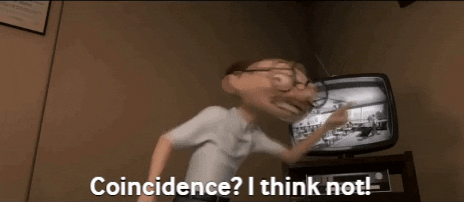
I’ve always found Bakar’s ability and his trial to be very random after the sophisticated dungeons we had to go through for the other Keepers, but if we consider that the writers of HL took inspiration from the the ancient theois aner as the originals wielders of Ancient Magic and that the 4 disciplines highlighted are at the core of the abilities granted to a wizard by Ancient Magic, then suddenly his trial makes sense!
[And, if you would allow me a completely crazy tangent here!, I just realized that the only 3 ‘special abilities’ we know of in the Wizarding world, i.e. Metamorphmagi, true Seers and Parselmouths, just happen to correspond to 3 of the 4 Ancient Magic disciplines! And for the metamorphmagi and parselmouths, it’s not just any type of transfiguration ability or ability to care for animals, it’s specifically self-transfiguration and an ability to talk to animals, which are exactly what Pythagoras was known to be able to do! Is that a coincidence?🤯😵 Could we imagine that over time some of the ‘Ancient Magic abilities’ got passed down into the blood of ‘regular’ wizards to become rare inheritable traits? The exception here being time-travel since we don’t know of anyone having a natural ability to time-travel. But time-travel could be an exception since I don’t think Niamh Fitzgerald herself is able to time-travel, she still uses an old version of a time-turner that she wears around her neck, but maybe she has a special ability that makes her immune to the effects of time-travel (we see these ageing effects with Prof Hecat)? And since in 1899 time-travel becomes heavily restricted, anyone having special time-travel abilities would not even know it! Anyway, food for though! And now back to our regularly scheduled programming!]
And the parallels don’t stop there! I’m basing myself here mostly on the Wikipedia page for Magic in the Greco-Roman world since I haven’t had time to do extensive research on the lives each of the other known theois aner. But the amount of parallels between the game and the Wikipedia article is still interesting if we try to find possible sources of inspiration for the HL writers who may have read the same article.
Empedocles was also considered one of the theios aner and he followed Pythagoras' philosophy. Here’s what the Wikipedia article says about him:
Empedocles (c. 490 – c. 430 BCE) too has ascribed to him marvelous powers associated with later magicians: that is, he is able to heal the sick, rejuvenate the old, influence the weather and summon the dead. […] It is important to note that after Empedocles, the scale of magical gifts in exceptional individuals shrinks in the literature, becoming specialized. Individuals might have the gift of healing, or the gift of prophecy, but are not usually credited with a wide range of supernatural powers as are magoi like Orpheus, Pythagoras and Empedocles.
And does that not remind you of someone? Someone who wanted to heal the sick and after whose death the practice of Ancient Magic was significantly changed to become much more restricted, with very few even knowing what Ancient Magic even is?
I don’t know if I’m the only one but the story of Pythagoras and Empedocles (as it is presented in the wikipedia article at least) reminds me of Isidora and the Keepers. Some ‘dark magic’ practices are attributed to Empedocles (summoning the dead), like the ‘dark magic’ practices of Isidora who siphons emotions out of people, and after their death some aspect of the practice of Ancient Magic is lost, with either Ancient Magic wielders (or theios aner) becoming way less powerful or the Keepers locking Ancient Magic away permanently.
If we accept that the ancient theios aner have indeed been used as inspiration for the Ancient Magic wielders, it could be a sort of ‘history repeating itself’ scenario where at several points of history some theios aner abused their tremendous power to do some things considered unnatural or dangerous (summoning the dead, taking away people’s pain) and when that happened other theios aner (perhaps organised into a secret Society for Ancient Magic?) stepped in and placed regulations and restrictions on the use of Ancient Magic, such as dividing the foundational ‘Ancient Magic Powers’ (i.e. time-travel, divination, transfiguration and a connection to animals) among four different Ancient Magic users and not permitting anyone to wield all four together, or, in the Keepers’ time, hiding Ancient Magic away altogether and not permitting anyone to learn it anymore.
29 notes
·
View notes
Text
Manifesto of the Communist Party
[ Table of Contents | Next ▹ ]
A spectre is haunting Europe – the spectre of communism. All the powers of old Europe have entered into a holy alliance to exorcise this spectre: Pope and Tsar, Metternich and Guizot, French Radicals and German police-spies.
Where is the party in opposition that has not been decried as communistic by its opponents in power? Where is the opposition that has not hurled back the branding reproach of communism, against the more advanced opposition parties, as well as against its reactionary adversaries?
Two things result from this fact:
Communism is already acknowledged by all European powers to be itself a power.
It is high time that Communists should openly, in the face of the whole world, publish their views, their aims, their tendencies, and meet this nursery tale of the Spectre of Communism with a manifesto of the party itself.
To this end, Communists of various nationalities have assembled in London and sketched the following manifesto, to be published in the English, French, German, Italian, Flemish and Danish languages.
I. Bourgeois and Proletarians*
* By bourgeoisie is meant the class of modern capitalists, owners of the means of social production and employers of wage labour. By proletariat, the class of modern wage labourers who, having no means of production of their own, are reduced to selling their labour power in order to live. [Engels, 1888 English edition]
The history of all hitherto existing society† is the history of class struggles.
† That is, all written history. In 1847, the pre-history of society, the social organisation existing previous to recorded history, all but unknown. Since then, August von Haxthausen (1792-1866) discovered common ownership of land in Russia, Georg Ludwig von Maurer proved it to be the social foundation from which all Teutonic races started in history, and, by and by, village communities were found to be, or to have been, the primitive form of society everywhere from India to Ireland. The inner organisation of this primitive communistic society was laid bare, in its typical form, by Lewis Henry Morgan's (1818-1861) crowning discovery of the true nature of the gens and its relation to the tribe. With the dissolution of the primeval communities, society begins to be differentiated into separate and finally antagonistic classes. I have attempted to retrace this dissolution in The Origin of the Family, Private Property, and the State, second edition, Stuttgart, 1886. [Engels, 1888 English Edition and 1890 German Edition (with the last sentence omitted)]
Freeman and slave, patrician and plebeian, lord and serf, guild-master‡ and journeyman, in a word, oppressor and oppressed, stood in constant opposition to one another, carried on an uninterrupted, now hidden, now open fight, a fight that each time ended, either in a revolutionary reconstitution of society at large, or in the common ruin of the contending classes.
‡ Guild-master, that is, a full member of a guild, a master within, not a head of a guild. [Engels, 1888 English Edition]
Our epoch, the epoch of the bourgeoisie, possesses, however, this distinct feature: it has simplified class antagonisms. Society as a whole is more and more splitting up into two great hostile camps, into two great classes directly facing each other – Bourgeoisie and Proletariat.
From the serfs of the Middle Ages sprang the chartered burghers of the earliest towns. From these burgesses the first elements of the bourgeoisie were developed.
The discovery of America, the rounding of the Cape, opened up fresh ground for the rising bourgeoisie. The East-Indian and Chinese markets, the colonisation of America, trade with the colonies, the increase in the means of exchange and in commodities generally, gave to commerce, to navigation, to industry, an impulse never before known, and thereby, to the revolutionary element in the tottering feudal society, a rapid development.
The Communist Manifesto - Part 1
[ Table of Contents | Next ▹ ]
51 notes
·
View notes
Text
Funny story, the other day I received a question about the quotation "Until you make the unconscious conscious, it will direct your life and you will call it fate". (Sorry to the person who asked because I lost track of your handle and must now post the full response here. You're about to see the journey you've sent me on.) The question was vaguely worded, so I can only assume it was requesting a source for the quotation. This struck me as odd for a couple reasons. First, the quotation is widely attributed to Jung, so it shouldn't be very difficult to find the source. When I say "widely", I mean it is not only used all over the internet, it also appears in numerous books. Second, the quotation does a great job of encapsulating a central tenet of Jung's theory, so there is nothing particularly strange or suspicious about it.
Since I'm used to academic writing and wading through research materials, I'm usually diligent about finding the original source of quotations in order to avoid misattributions. But I was lax in this case because I allowed myself to assume that such a well-known quotation must have already been checked by someone. A mistake. A preliminary search revealed that a small handful of people have doubted the attribution, but a definitive answer seemed elusive. So, I decided to take a deep dive into the literature. I searched through Jung's as well as whatever Jung-adjacent and Jung-inspired works I could get my hands on.
I was unable to find a verbatim source in Jung's own writing. However, this isn't enough for me to claim that he never said it. It's possible that it was lifted from a discussion, lecture, or interview, of which the transcripts are not readily available. Jung did write sentences that were remarkably similar to the quotation in meaning, so it's also possible that the quotation was somehow mangled or lost in translation from the original language, which makes it difficult to match up with the official English editions of his work.
I then decided to locate its earliest usage in order to piece together an origin story. The earliest date I could find was ~2006, which is a huge red flag. Books by Jung and about Jung span the entire last century, so one would expect at least a few references from earlier periods, especially throughout the 90s when psychoanalytic theory was widely referenced in a variety of academic disciplines. Of course, books before the 90s haven't all been indexed and made available to search online, so a citation might still exist out there somewhere in a very obscure book.
I then decided to examine books published since 2006 that contained the quotation to see if any included a citation. This was even more of a red flag because, in every case, the authors either did not provide a citation, cited another post-2006 book, or cited a (dubious) internet resource. It turns out that 2006 might be an important piece of the puzzle because it was around then that goodreads.com went online and became a widely used resource for quotations.
Although goodreads makes it clear that they don't verify information, people often trust the website because it is assumed that readers are quoting accurately as they read the actual books. The Jung quotation in question is listed on their website and could even be the first instance, but there was no citation and I couldn't find who originally posted it in order to ask where they got it from. Whoever originally posted it was obviously familiar enough with Jungian theory to capture some of its essence.
In conclusion, I hazard to guess that there are three main possibilities for how this quotation came into being. Around the mid 2000s, someone reading something in the original language posted their own personal translation of it, or they got it from an obscure source, or they fabricated it for reasons unknown. From there, the quotation got picked up by various parties and spread far and wide.
I decided to tell this story because I think it's a good example of how misinformation creeps around online and gradually becomes "reality". The numerous steps I had to go through to investigate this one tiny piece of information illustrates how tedious it can be to verify the things you read. Should we expect the masses to verify every word they come across? It's not realistic, is it? Teachers and parents tell kids to be careful about the internet content they consume, to not take things at face value, to not believe everything they see and hear, etc. But it isn't easy (or fun) to always be on alert even for the motivated, even for this weary and grizzled researcher.
Fortunately, nobody's gonna die from a misattributed quote. But, what about subjects of consequence such as medicine or geopolitics where truth really matters? I love that we have so much information at our fingertips. I just wish we didn't always have to battle against greed and chaos to find the good stuff.
30 notes
·
View notes
Text
Worldbuilding Brainstorm???
in most scifi settings, there is either a common language or some sort of technology that translates languages.
I like the second one and here’s why:
A common language is too easy. Since everyone knows the same language, everyone speaks with the same grammar structure and similar speech patterns. Sure, everyone has accents and some don’t ever evolve past “broken” common, but a single verbal language isn’t exactly… plausible… to every species.
Think of it like this: birds mimic spoken words and sounds, but rarely ever sound real. Same with ai voices. Sure you can get pretty close, but unless you carefully map out each little inflection in tone and pitch, an ai voice will mess up in inhuman ways. Because it’s not human.
Humans also mimic sounds, but it takes years of practice to make those sounds truly believable because our vocal cords simply aren’t designed to meow and chirp.
So who’s to say every alien creature is physically capable of making the sounds required to speak the common language? That’s awfully presumptuous >;P imagine if humans met aliens and the aliens all speak in a squelching, squeaking and chirping warble? What if they sounded like bears or birds? Many humans have trouble mimicking OTHER HUMANS, even if it’s just an accent. How would we be able to learn a language we physically cannot replicate?
A common language makes more sense for a newly blooming galaxy, one that hasn’t truly connected so much as made contact with each other. As a larger variety of creatures join the stars, however, it simply becomes implausible to continue relying on a “common” language. So they do what everyone in a scifi genre does best! They make technology.
Depending on how far along the timeline you have your story going, the complexity and variety of translation technology would vary. The earliest translation devices would be handheld or digital, and would be limited to simple sentences like our modern translators. The translation would be word to word like google translate, and the only languages available would be the main ones of each planet (for earth, it would be English).
But as technology advances, you go from handheld devices like tablets to headsets and microphones that automatically translate what you say and play it through a speaker. Then the headsets turn into visors and eventually you have a brain implant. Perhaps they work for any species, perhaps they don’t. In my universe, chip translators process any language for you and transmit that information to your brain rather than play it out on a speaker or give you text to read.
The reason I like this distinction is because a brain chip that processes language for you would be a WILD experience for me. You’d be able to hear the things the other person is saying, the exact way they’re saying it, but you’d be comprehending that shit in YOUR OWN LANGUAGE. SHITS CRAZY MAN!
Imagine hearing someone speak Latin, never having known a word of it, but understanding exactly what they want even though you couldn’t translate it word for word. That would be so fuckin trippy.
You could even go further by applying non verbal languages. Of course with any surgery, this would have risks and complications should your translator get damaged, but imagine the possibilities!
Technology isn’t perfect, so obviously it will sometimes be unable to figure out what that person is actually saying. For example, in English, we often repeat things to accentuate the point and make sure people understand what is important. Perhaps some species of alien don’t understand this, leading to confusion and maybe even misunderstandings.
“I have to get this done. I have to.”
“Have to what?”
“Didn’t you hear what I just said?”
“Of course I did! What else do you have to do?”
The thing about this, however, is that verbal language isn’t universal. In fact, most expression from species to species would be different. Each species might have different body language. Different emotional expressions. Different stress responses. Different displays of affection.
This would make room for a lot of things to be learned about humans. I have a handful of little fluff drabbles and humor I came up with on this concept. I just have a feeling there’d be some things aliens just wouldn’t be prepared to deal with about humans and vice versa.
#writing inspiration#science fiction#i just love the humans are space orcs trope#sci fi writing#original post#sci fi shitpost#writing#humans are space orcs
28 notes
·
View notes
Text
Oliver's felt eyes on him since he left the palace.
It's not the usual stares he'll receive from the townspeople, it's something different. Even as his personal guards stand by him with the promise of protection and he tries to give the child in front of him his full attention, there's still... something. It makes him acutely aware of his surroundings. More-so than he should be when he’s trying to give the children his attention.
“Oh, but this won’t do. What’s happened to your tunic, Hugh?” Oliver sympathetically points out as he gestures down to the boy’s torn clothing.
“It had gotten caught on a branch while I played outside, Your Highness…” Hugh pulls at the tunic self-consciously. Who knows how long he’s had this same haphazardly-sewn piece of clothing? He always seems to be wearing it when Oliver comes to visit.
“I wish I would’ve known sooner. I’ll send for some new tunics for you and your friends. Perhaps you’d like to go fetch them and we’ll see what else is needed?” Oliver smiles encouragingly, and an amused chuckle escapes him at Hugh’s eagerness as the boy sprints towards his home.
“Aldo, would you please contact the local tailor at your earliest convenience? I’d like to commission him for a larger project.” Oliver stands back up and lightly wipes his knees of the dirt below him, pleased with the nod he gets from his personal guard.
“Of course, Your Highness.”
“What have I said before, dear friend?” Oliver lightheartedly rolls his eyes, scanning his surroundings. “I’m alright with you addressing me as—”
What is that?
His sentences cuts off and his smile slowly drops as his eyes land on something in the distance. A cloaked figure. It stands by one of the houses, barely hidden by the wall.
One hand raises and traces the stone, and he sees inked shapes, ones he’s never seen before, tracing along they’re forearm. A person’s fingertips shouldn’t be that black, the kind you see when you close your eyes tightly and block out the light.
Who is that, and why does the largest sense of familiarity draw him to it—
“Your Highness.”
It’s like the air comes back to his lungs and he’s able to think again when he’s addressed, glancing between Aldo and the waiting children around him. They show him ripped tunics, broken toys, worn-out shoes.
Right. Yes. The children.
Oliver looks back to the house from before. It’s vacant. As if no one had been there in the first place.
“…Well what are we doing, simply standing here? Show me what you’ve all got!”
Oliver kneels back down to their height, and falls back into his role. The role that’s needed of him.
In the distance, The Villain watches.
#Medieval Villain! Edith#Medieval Prince! Oliver#((drops this here and runs away))#((perhaps i’ll indulge these thoughts in the future))
11 notes
·
View notes